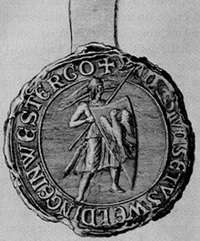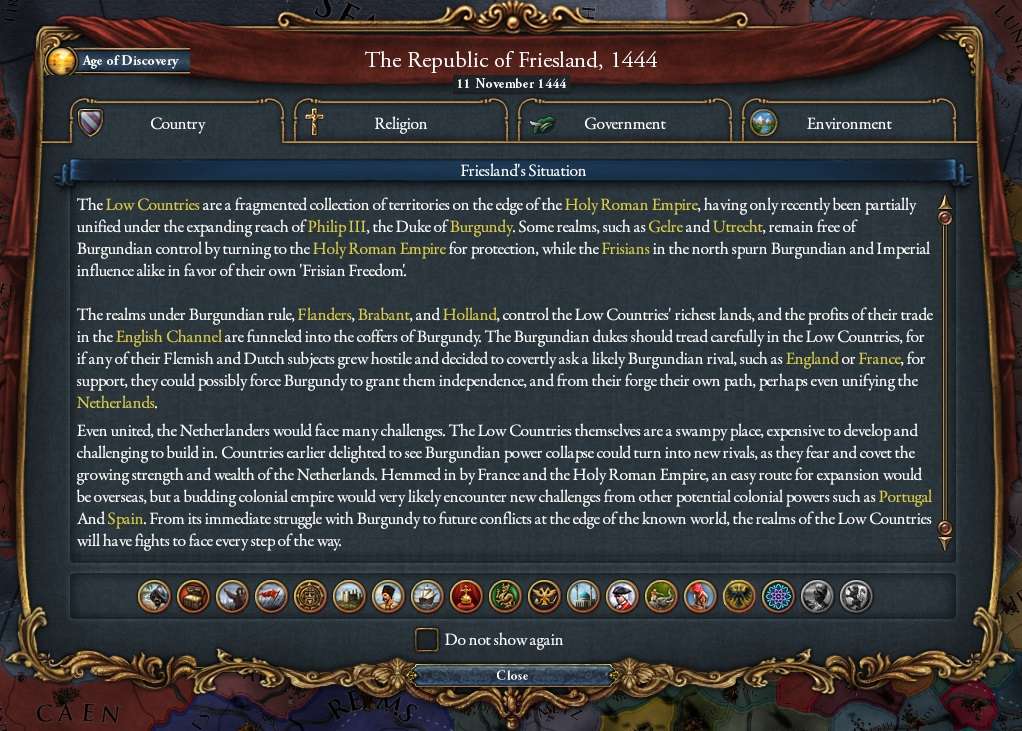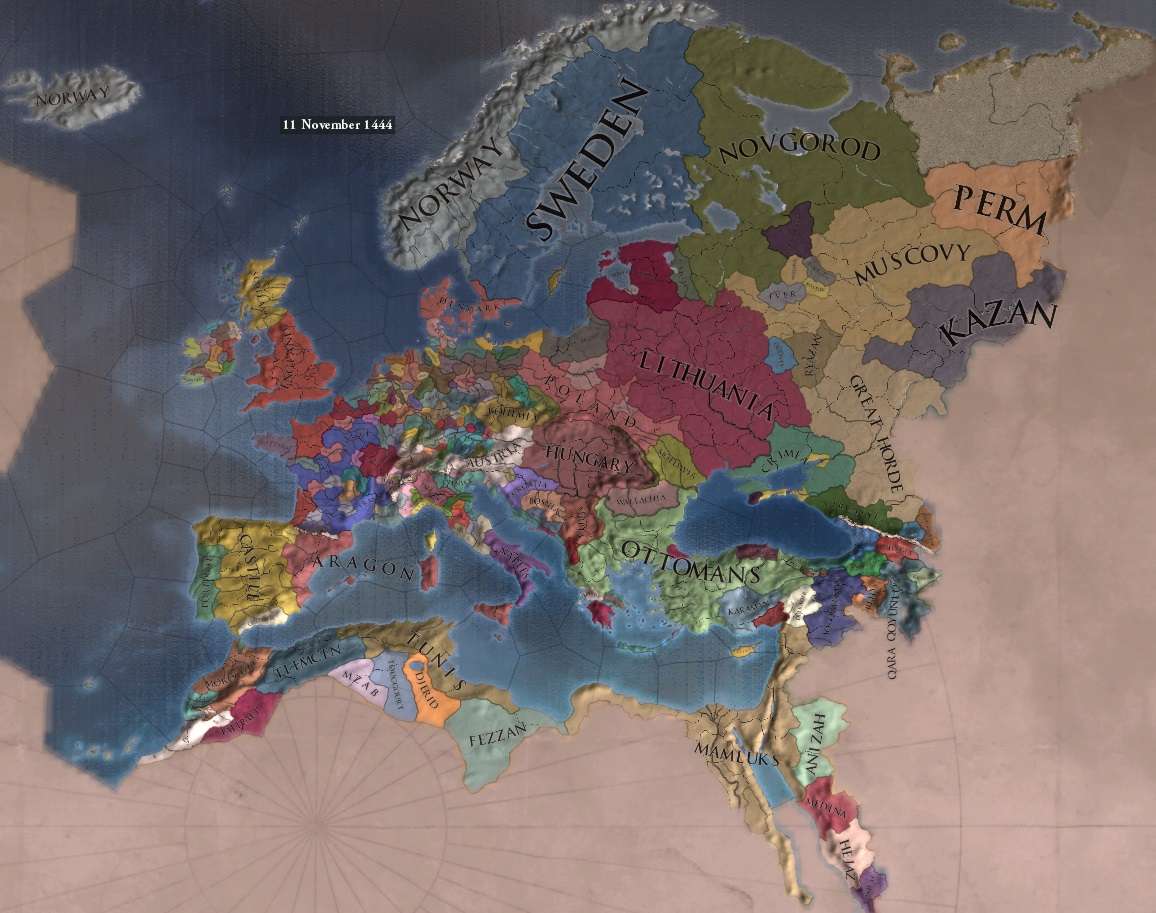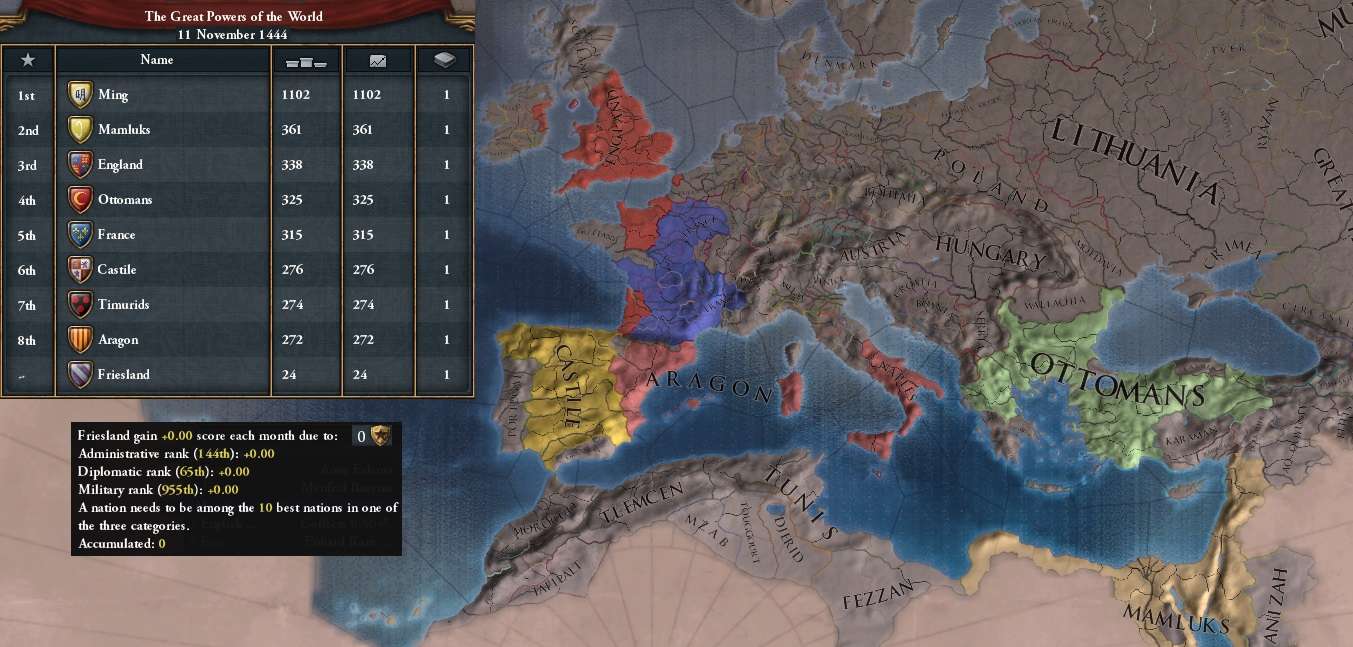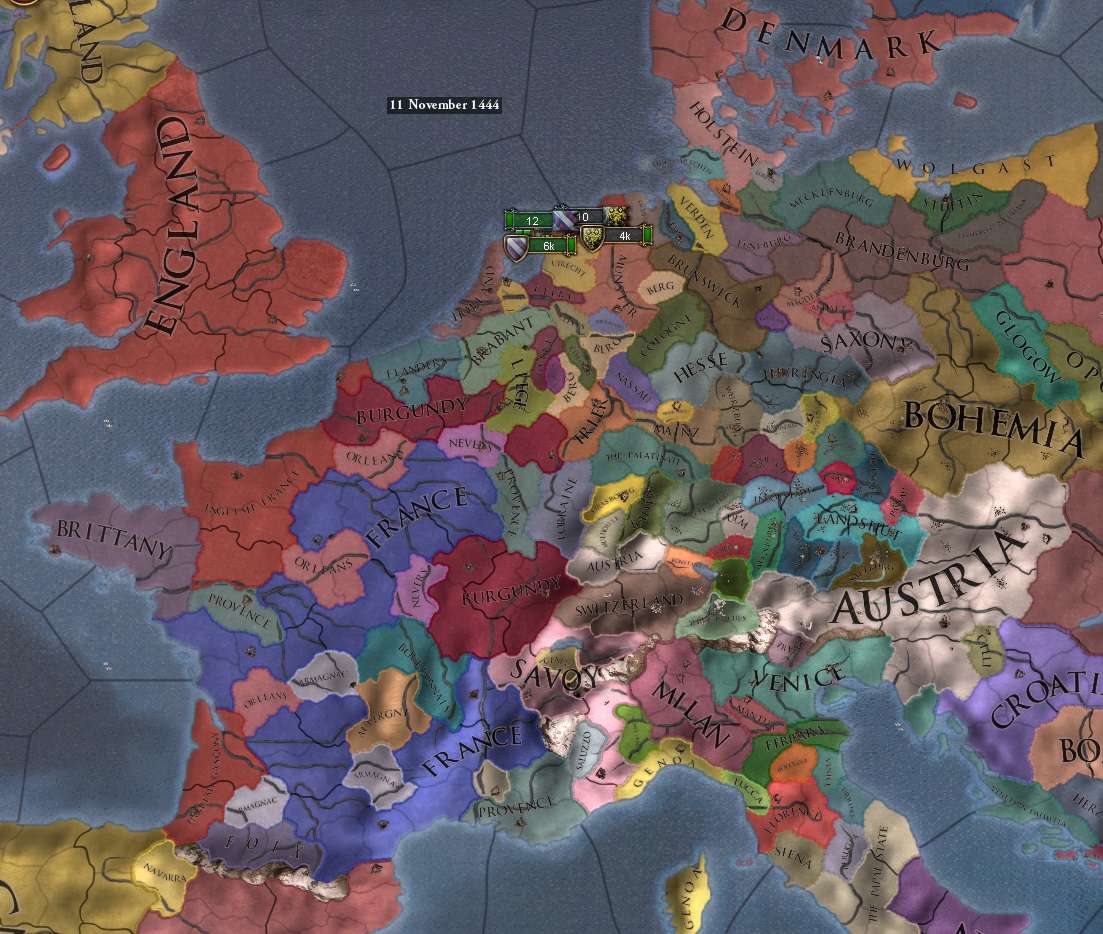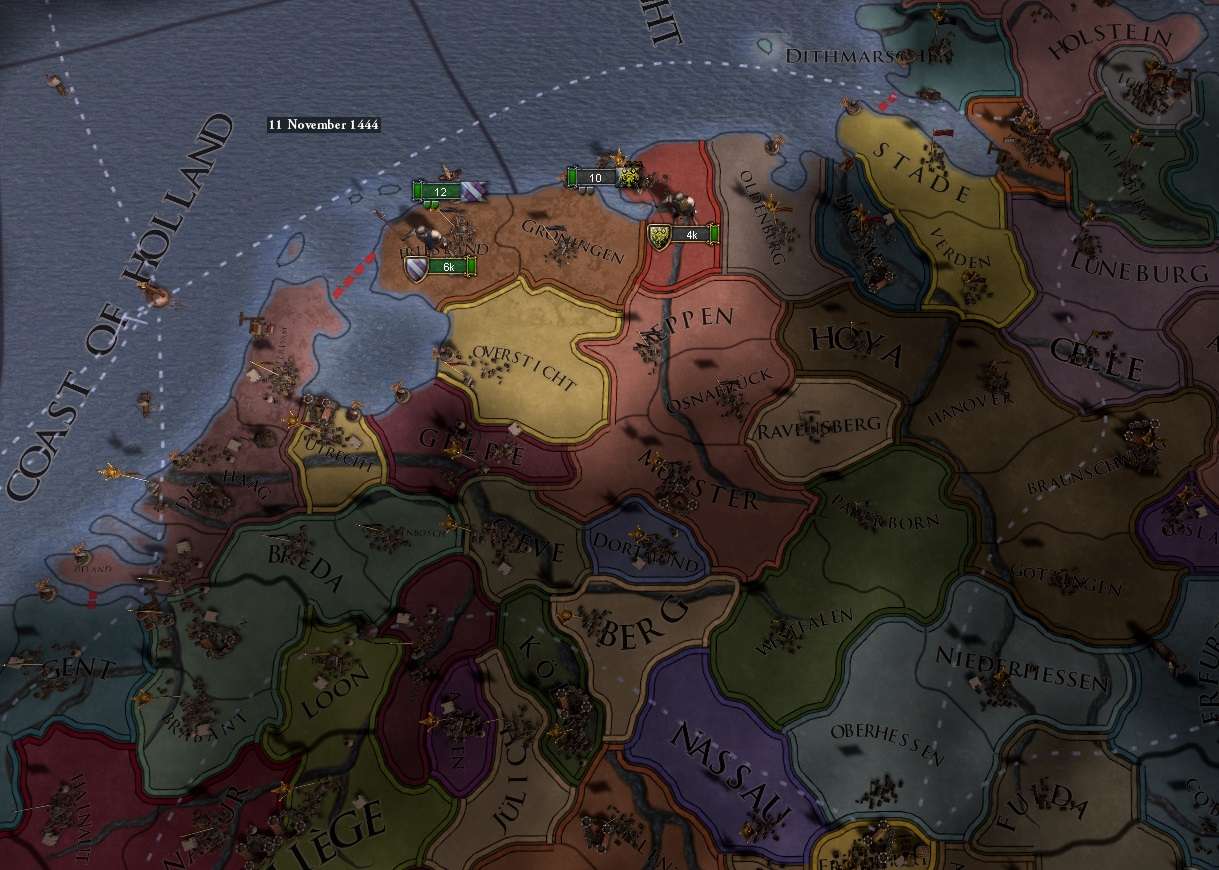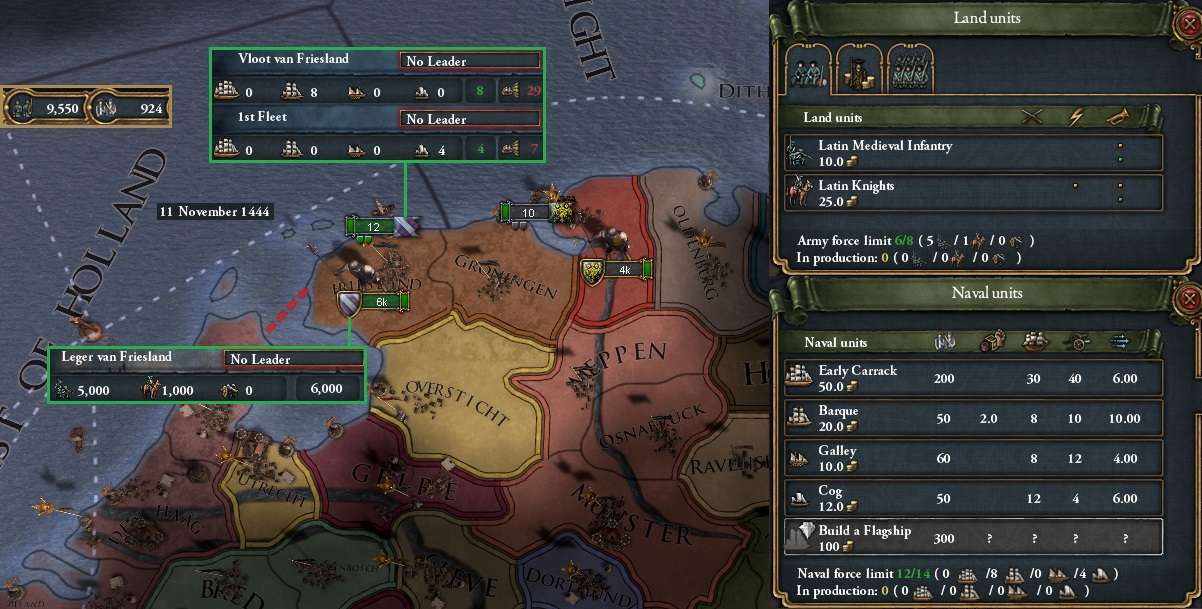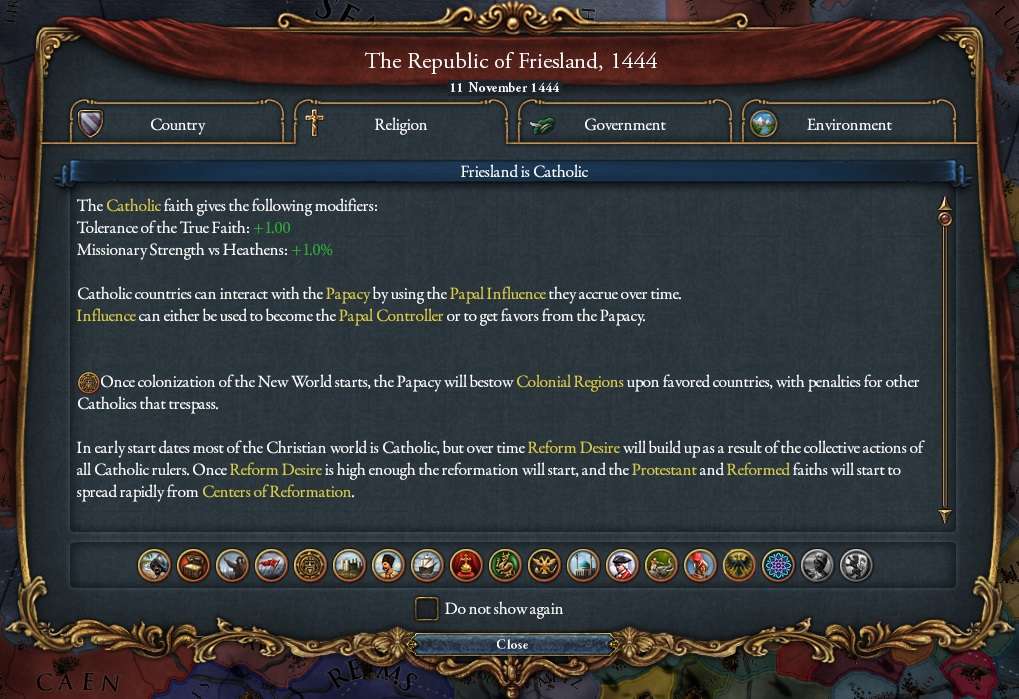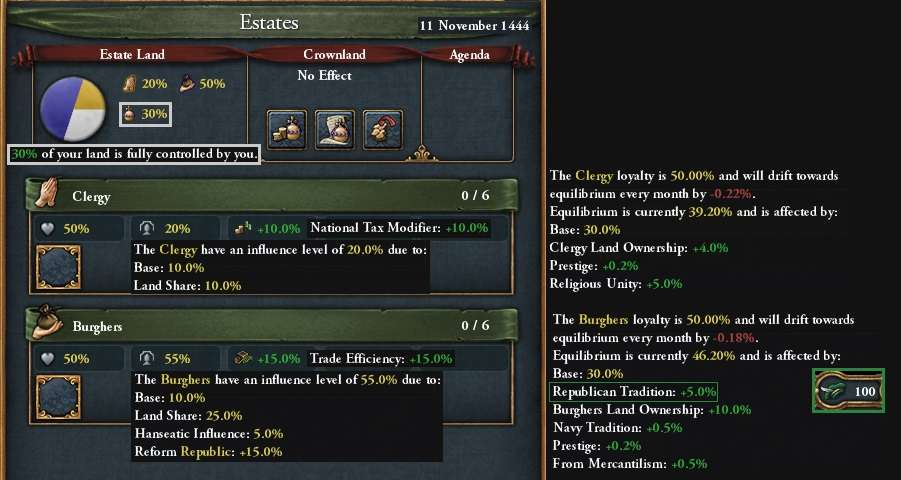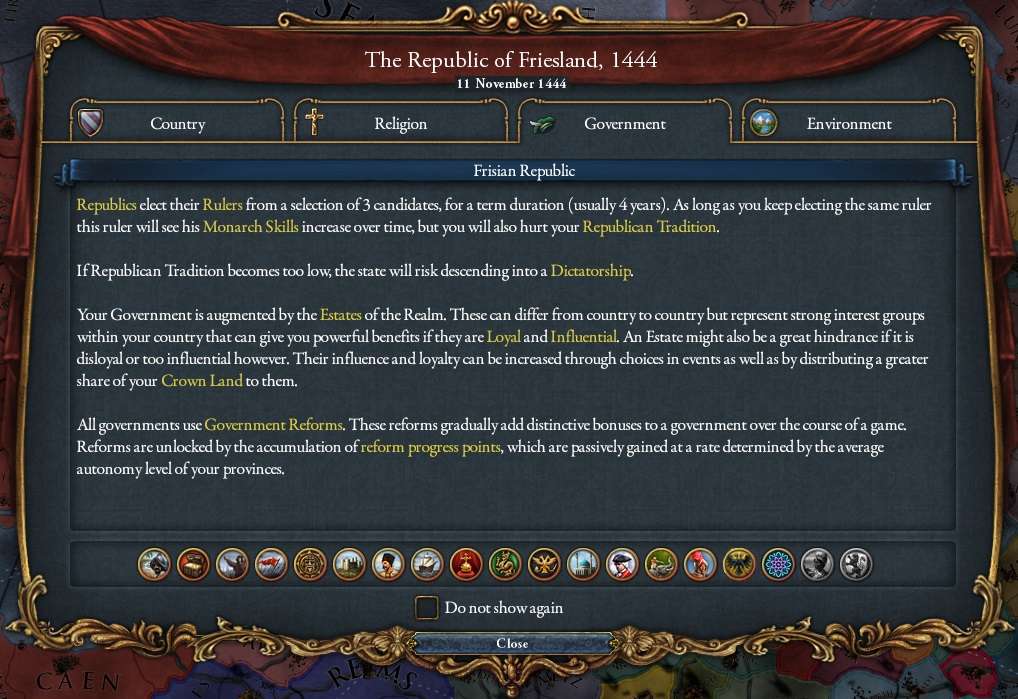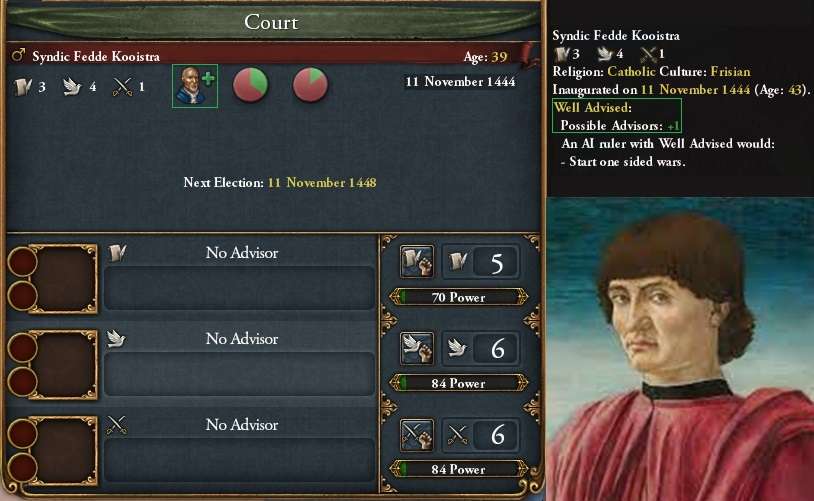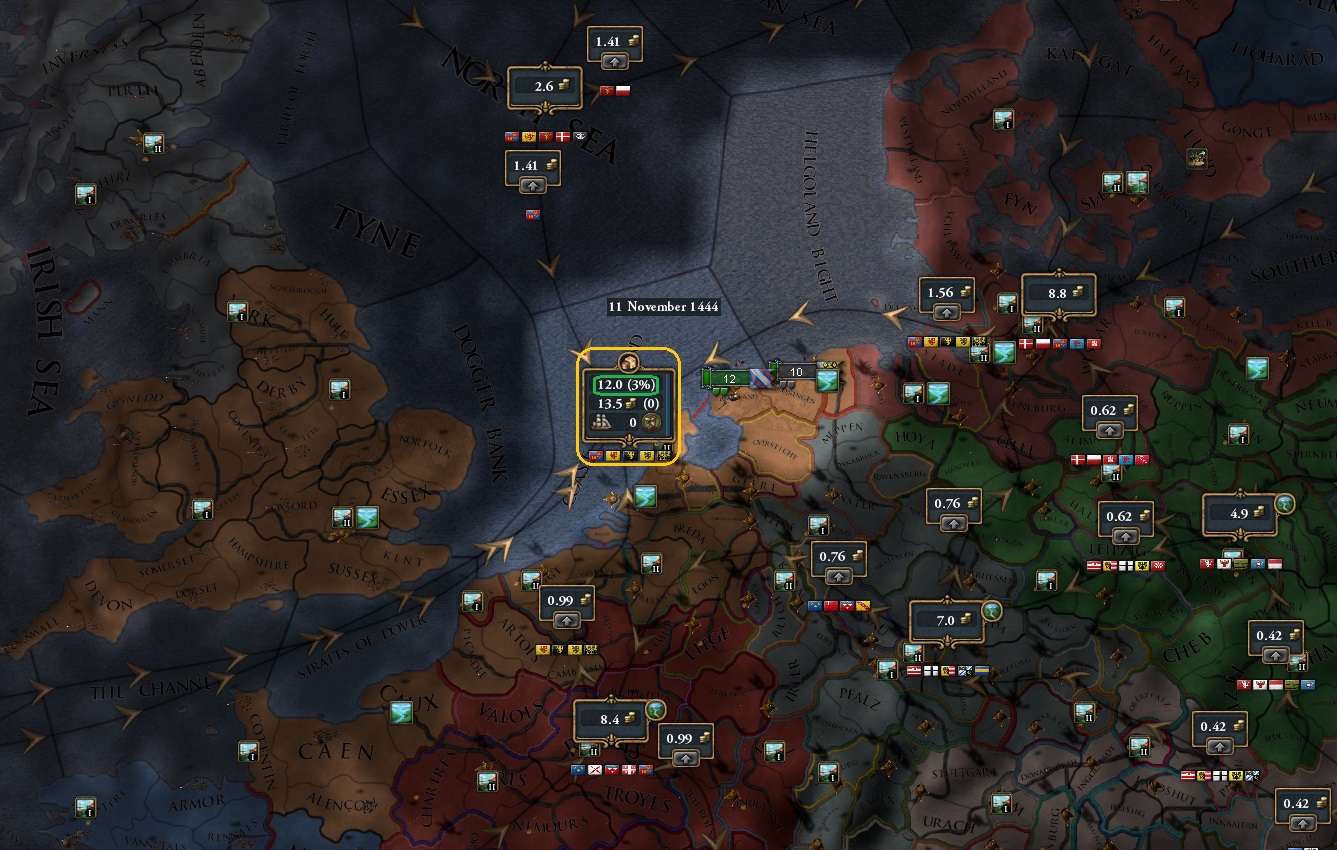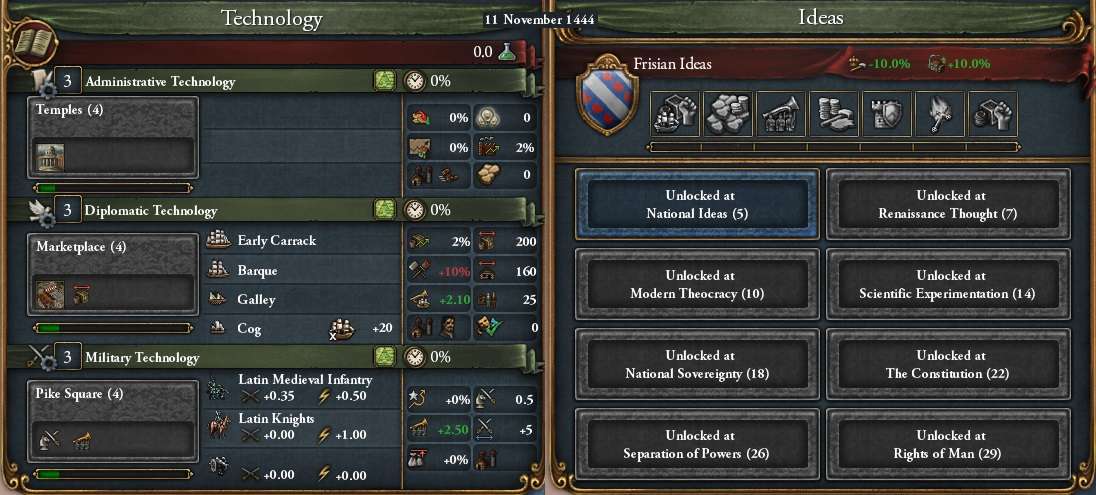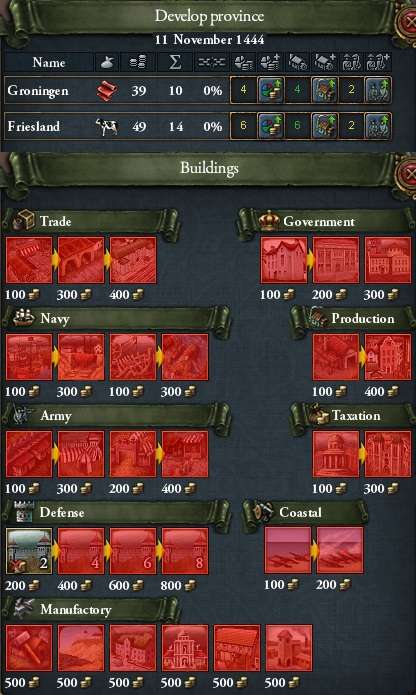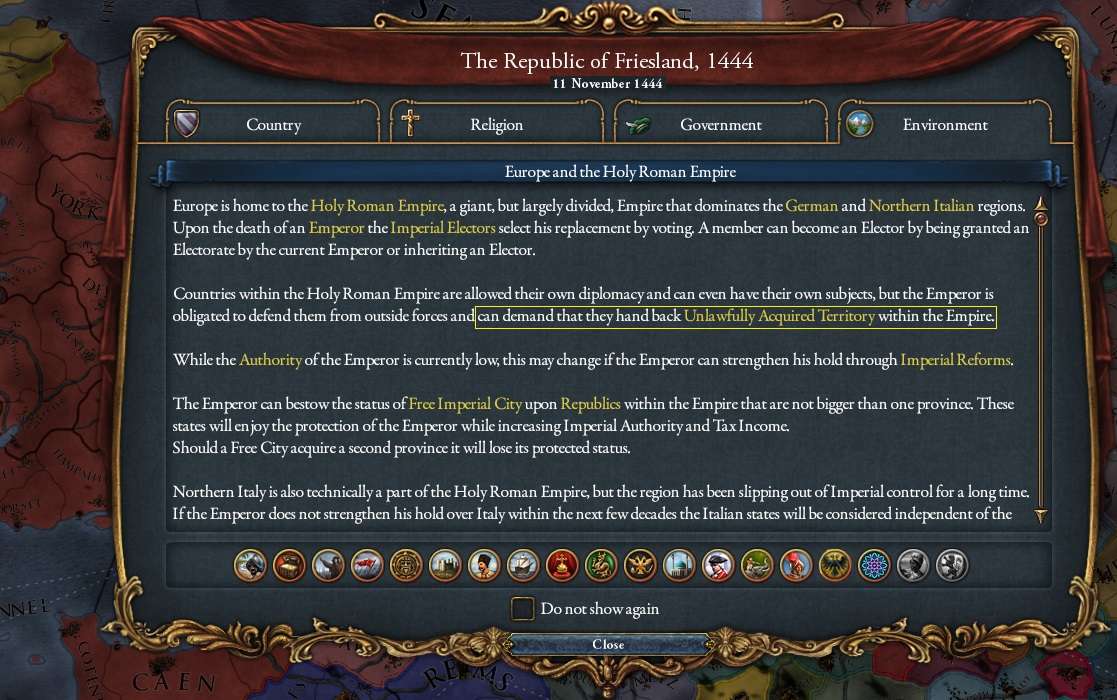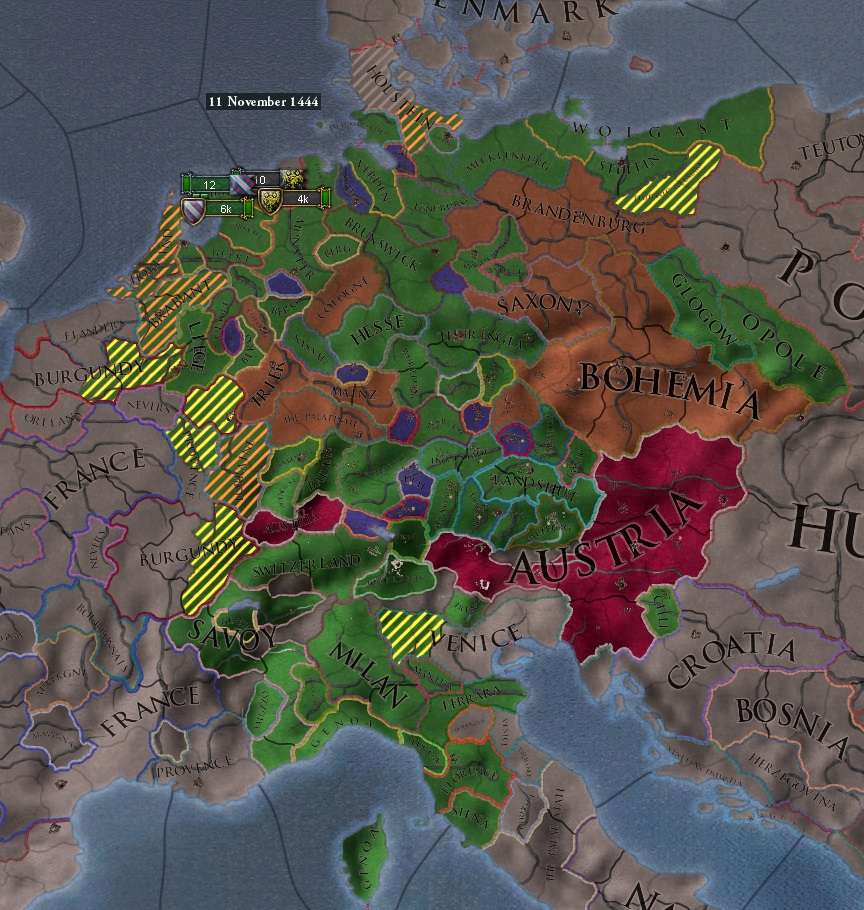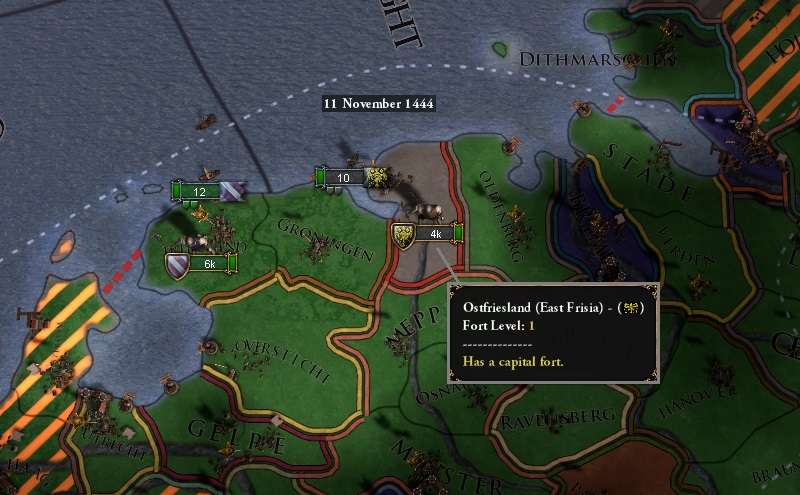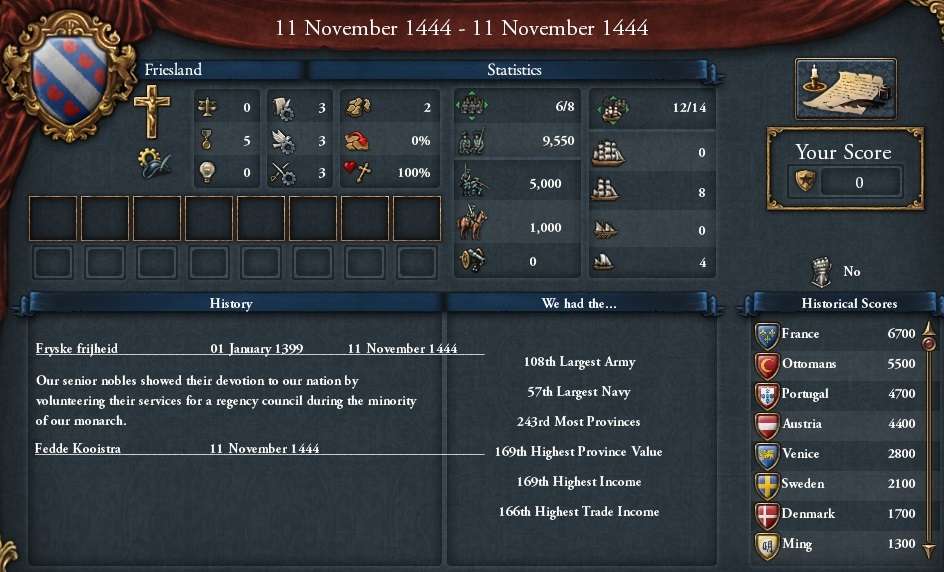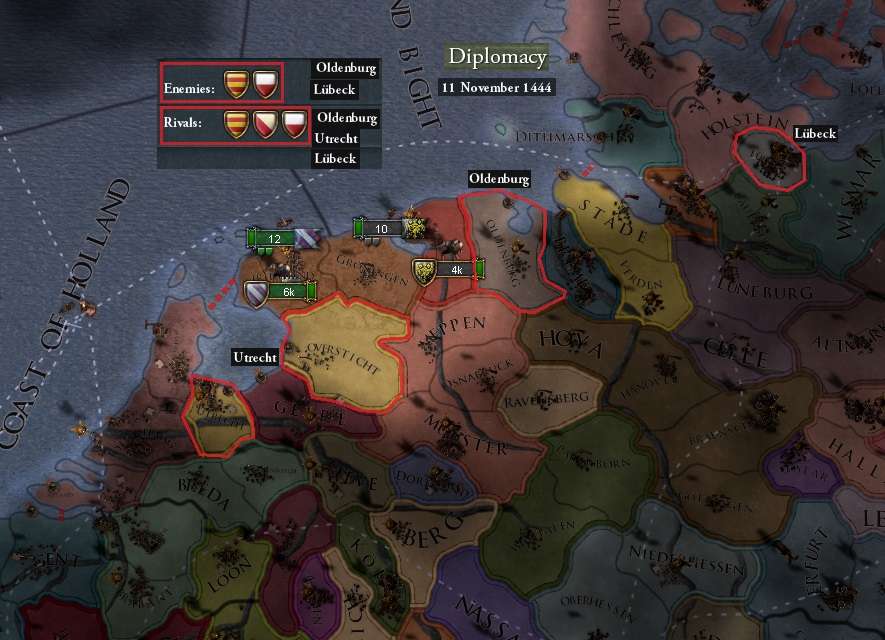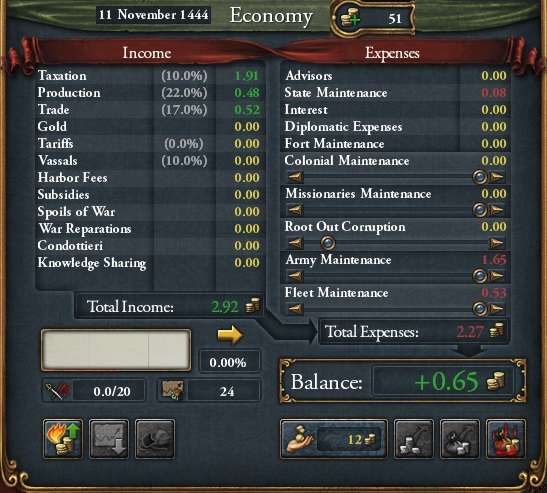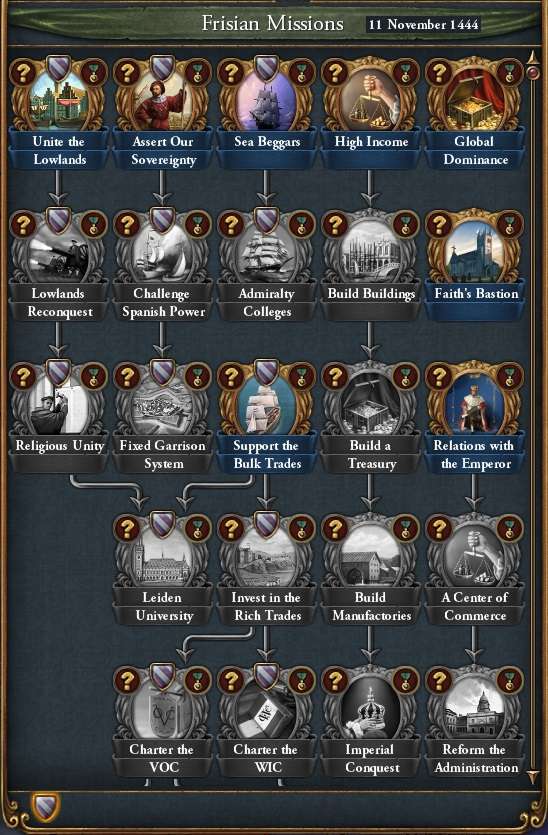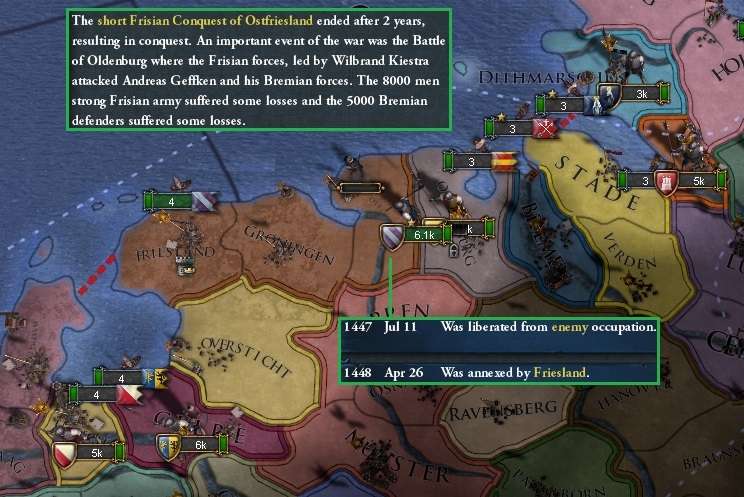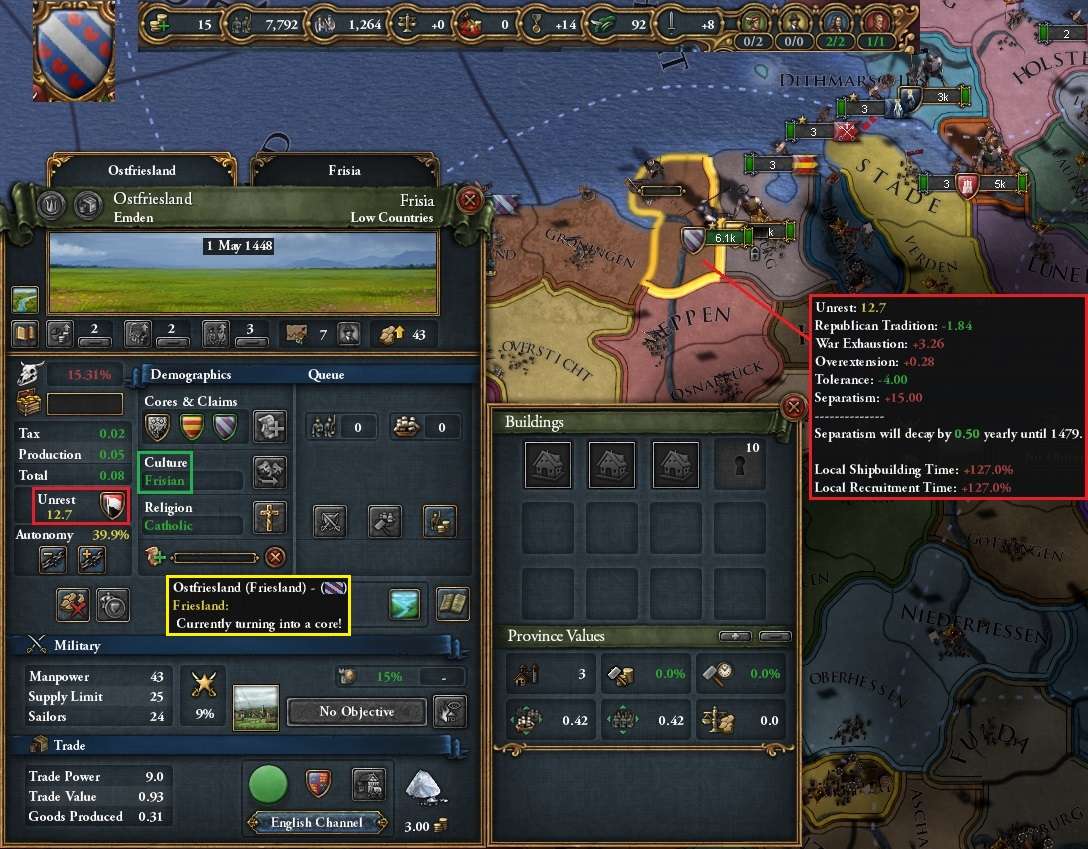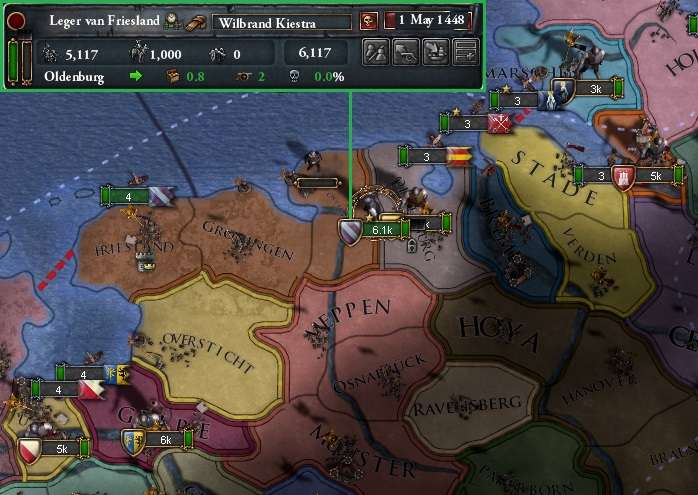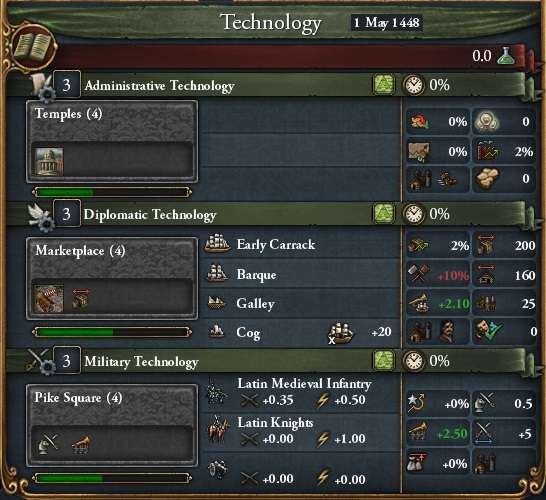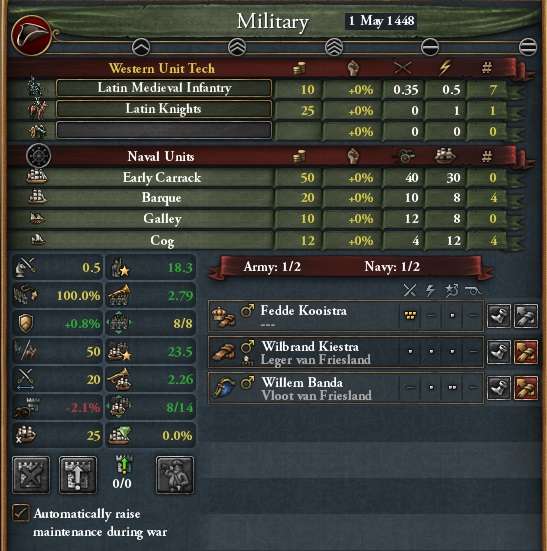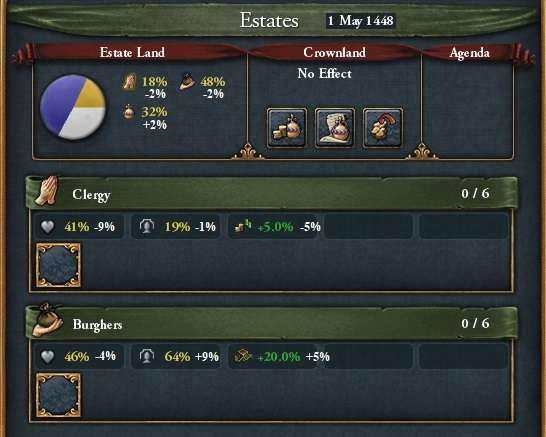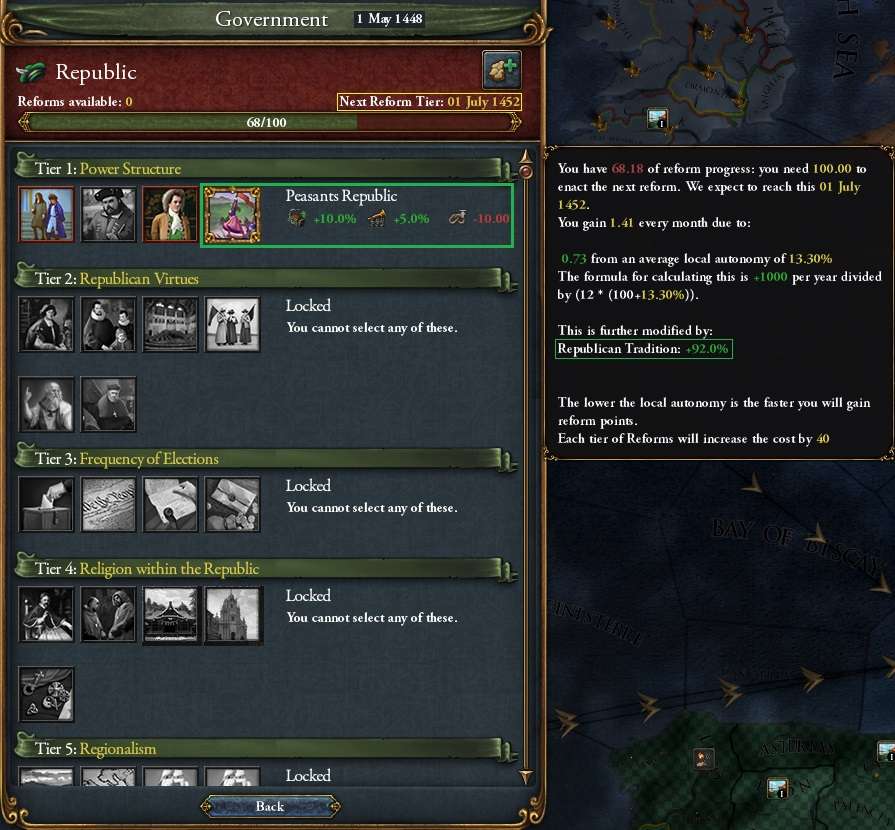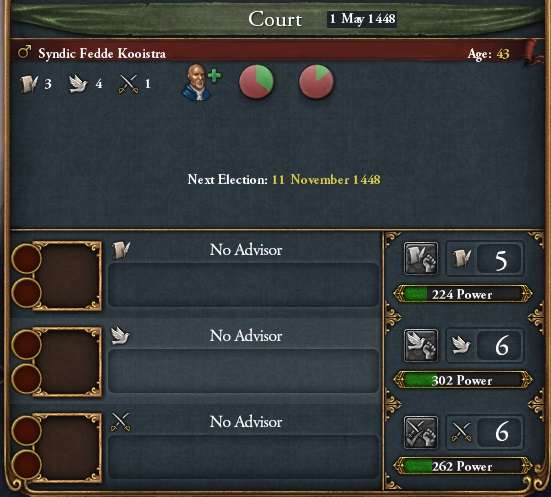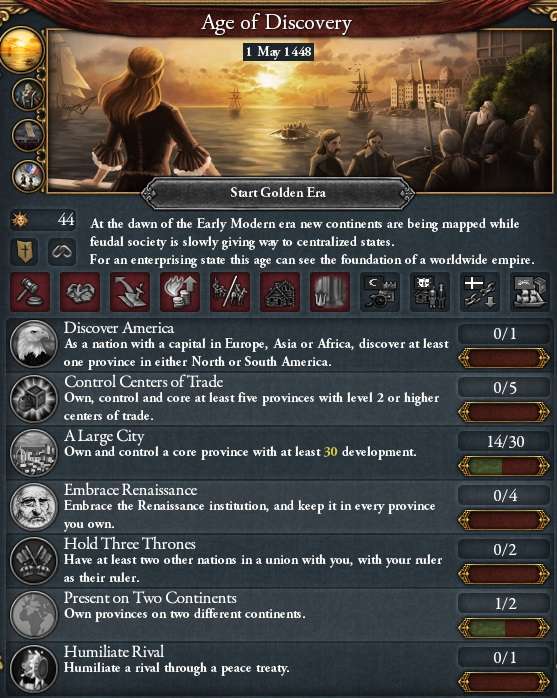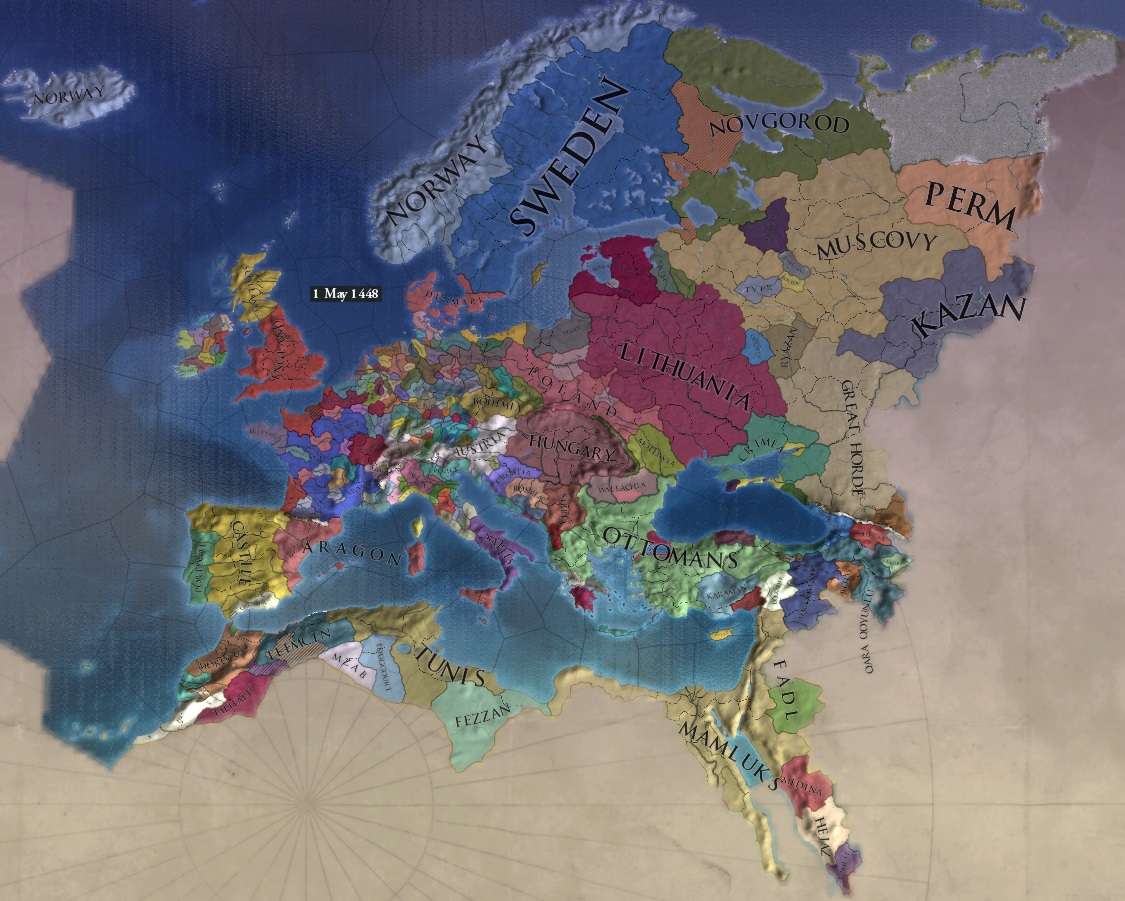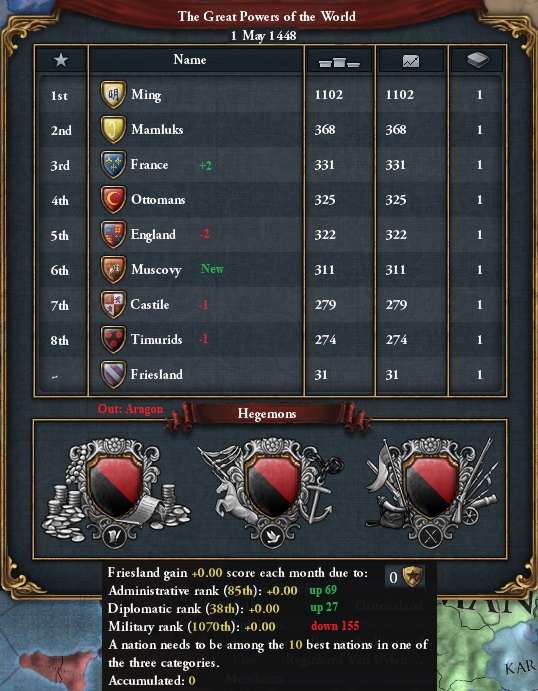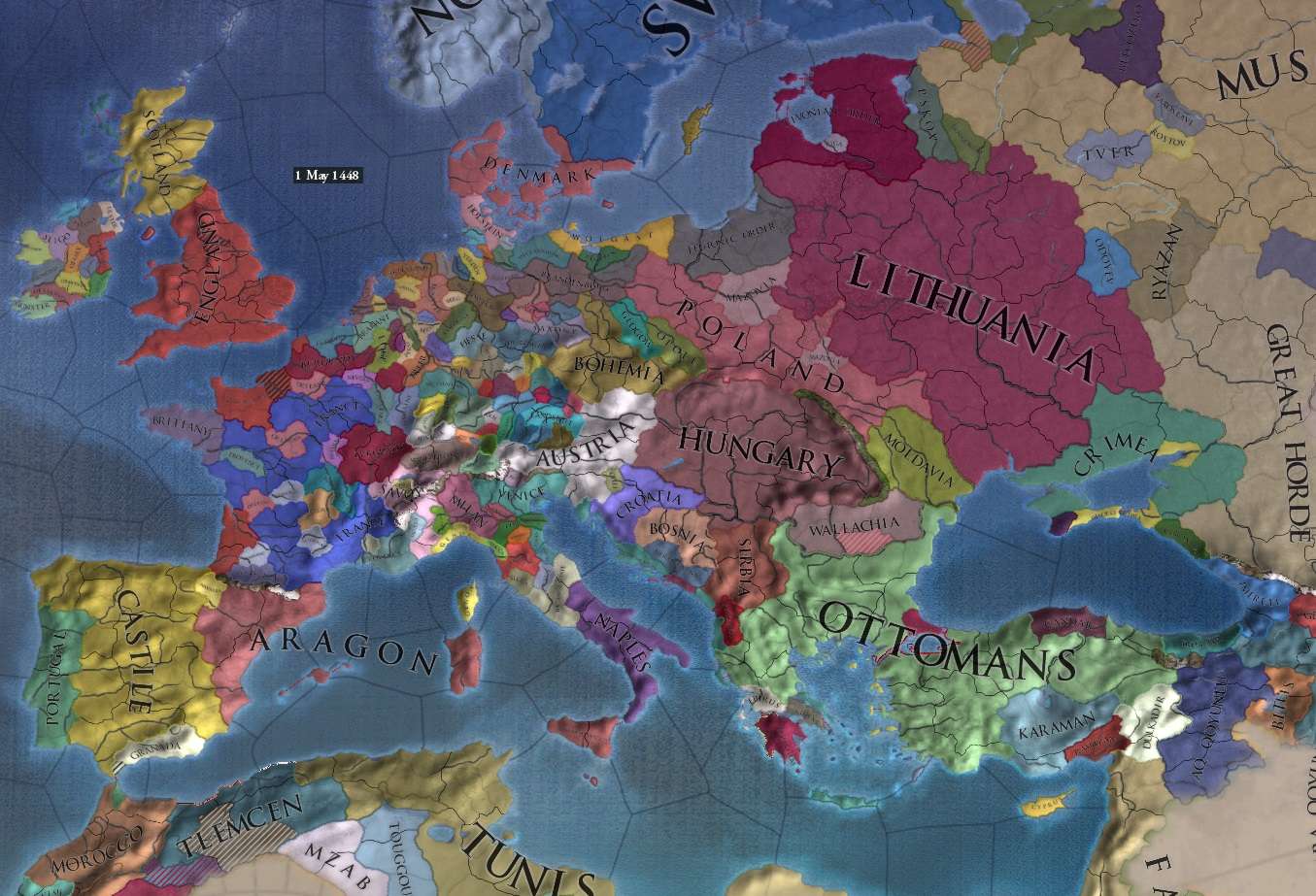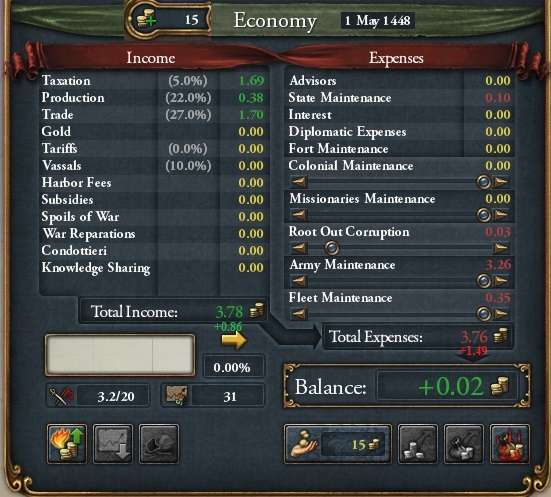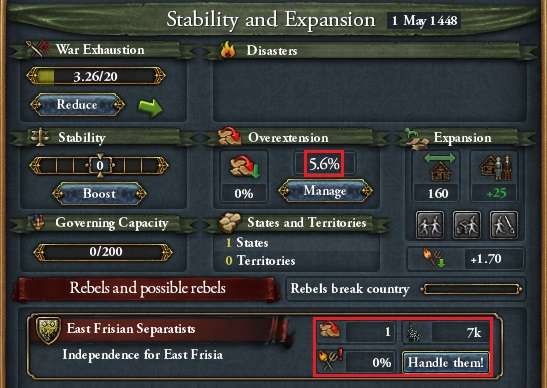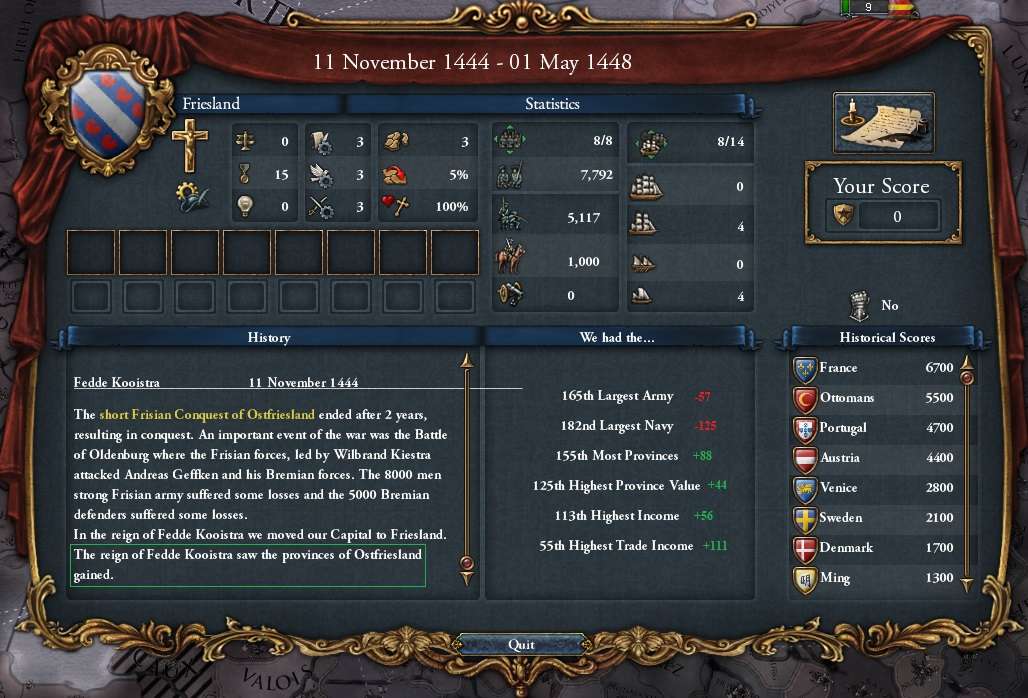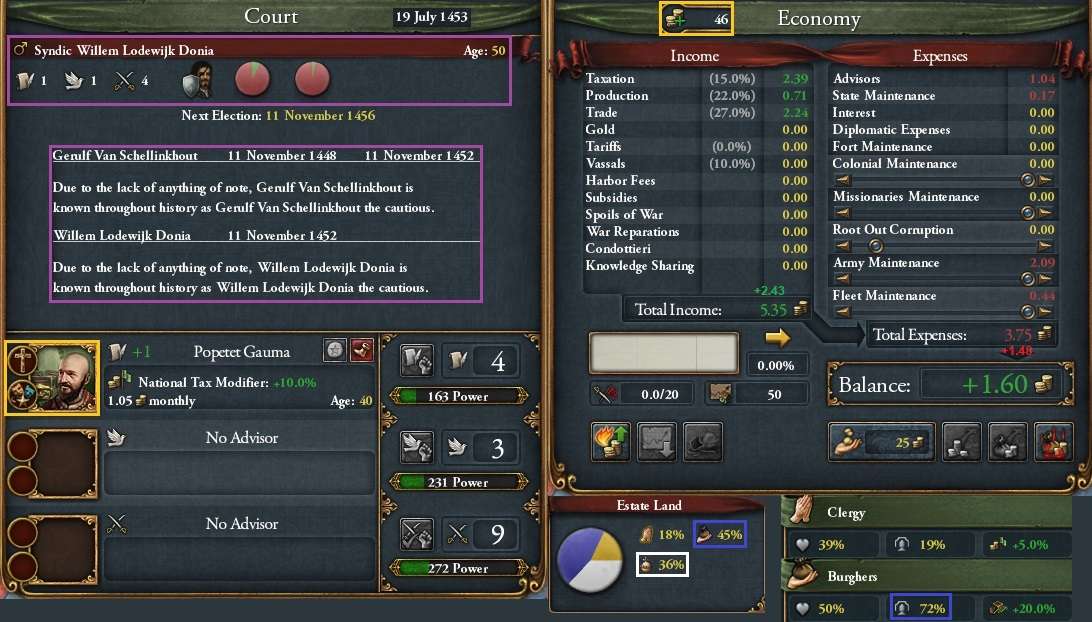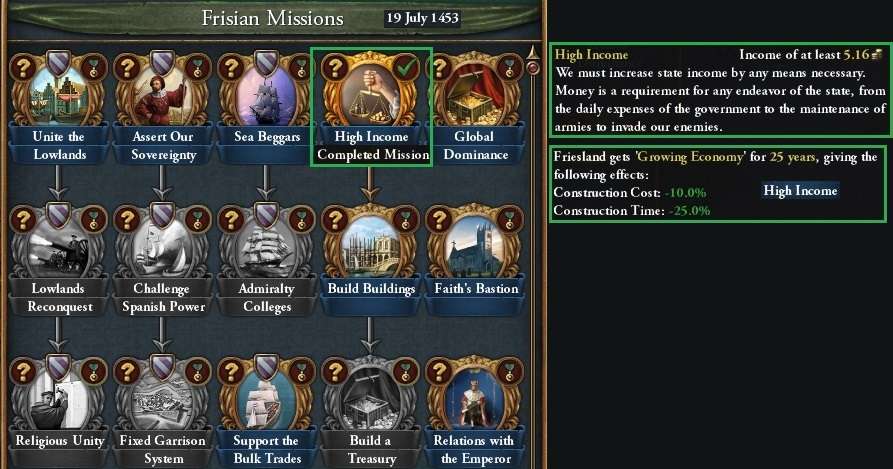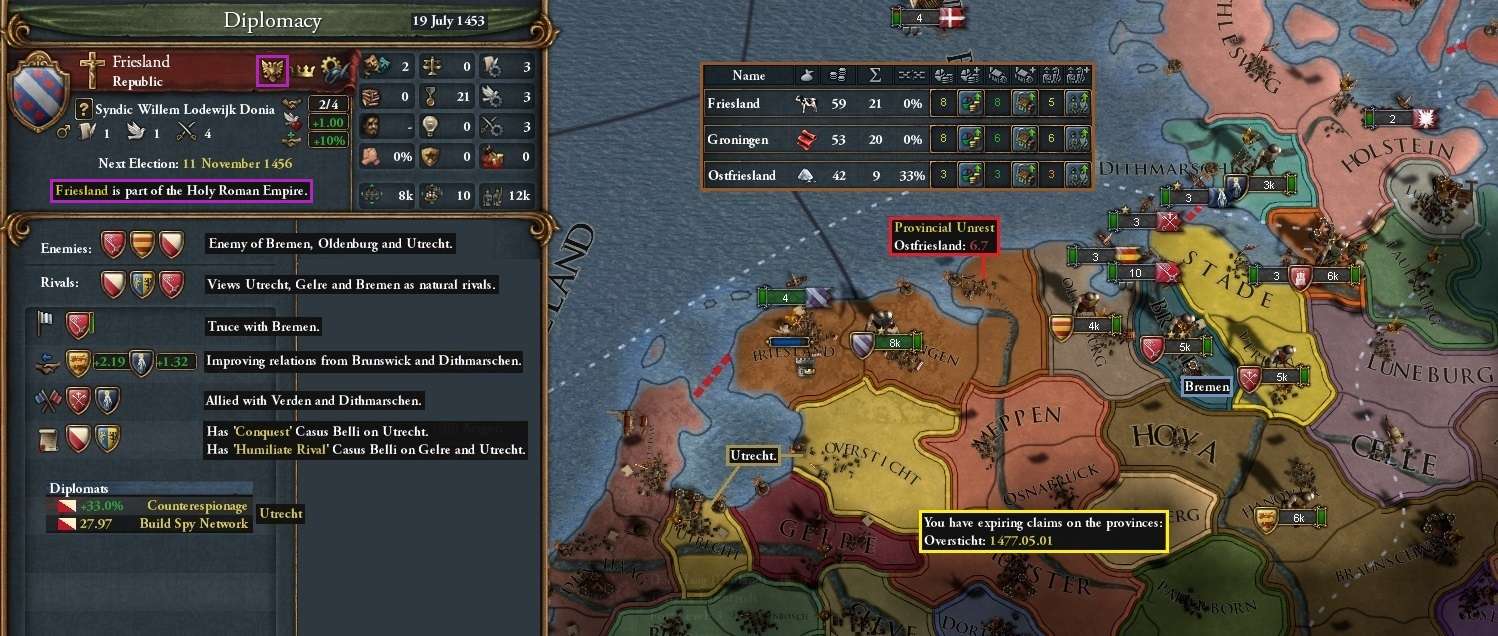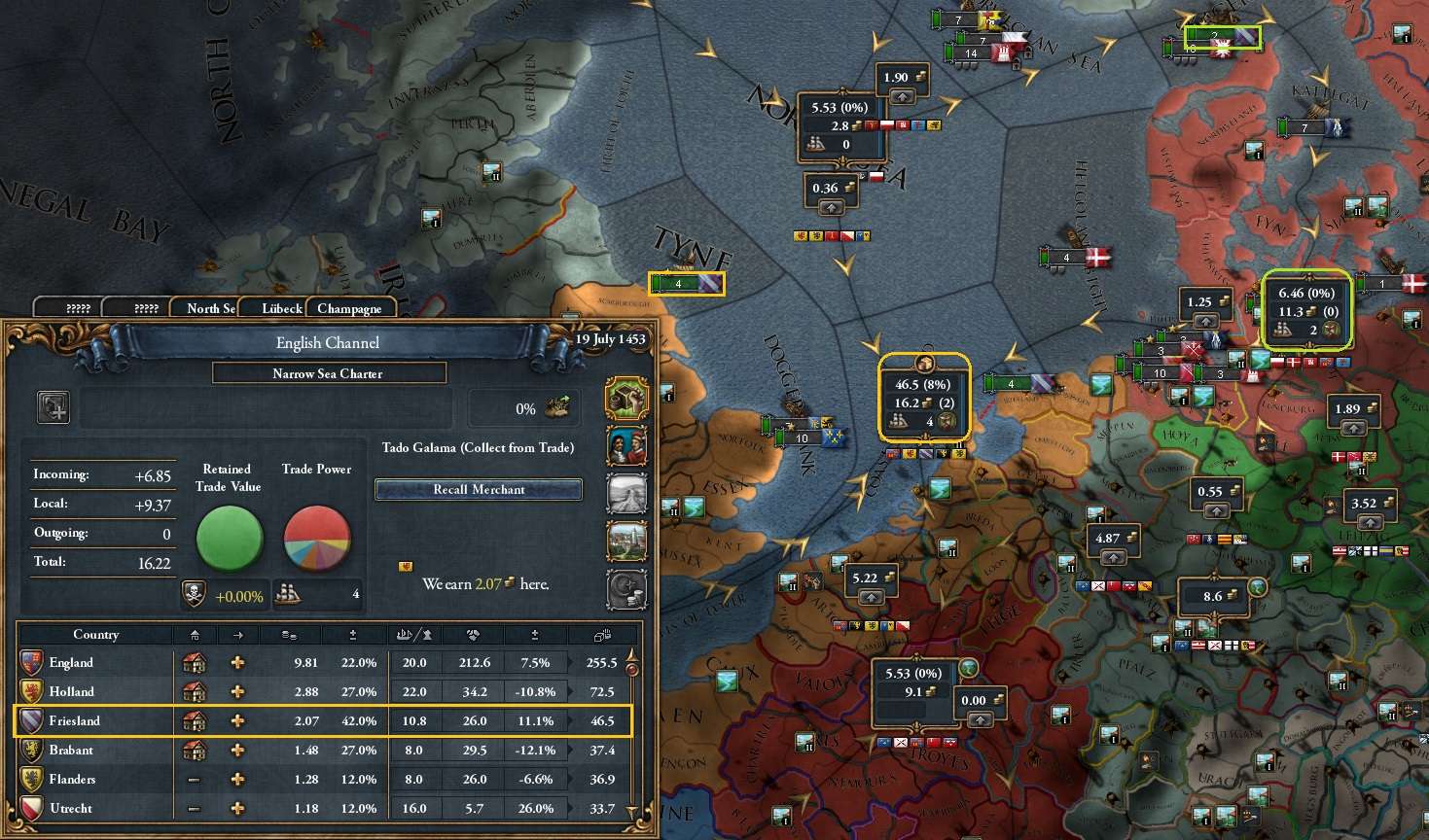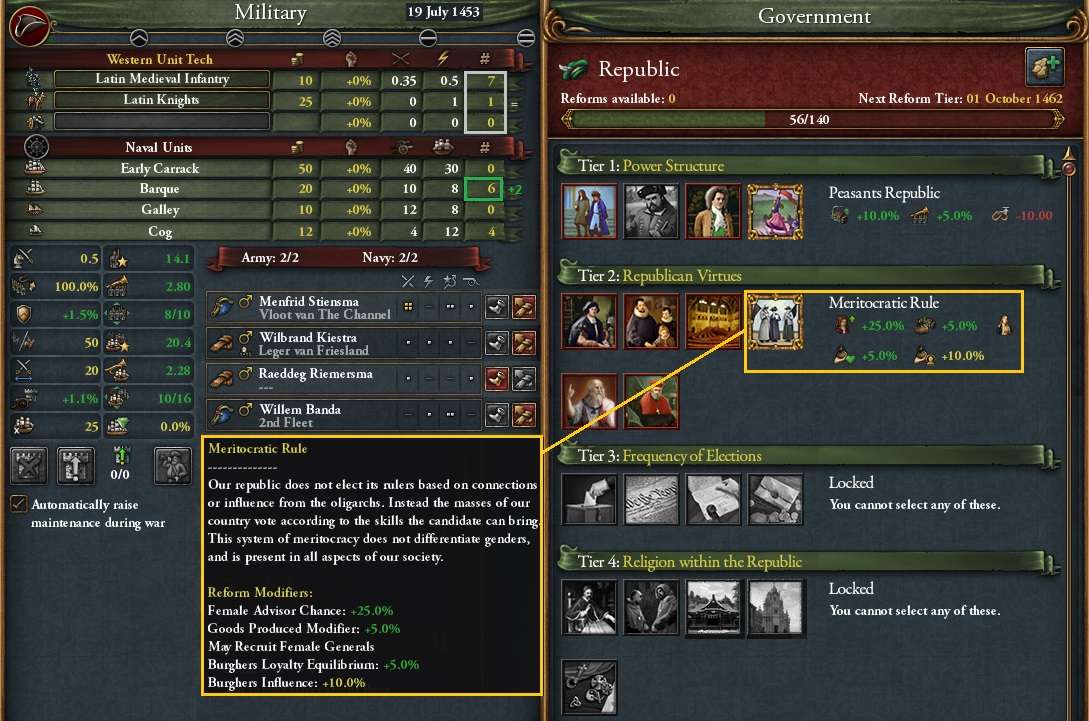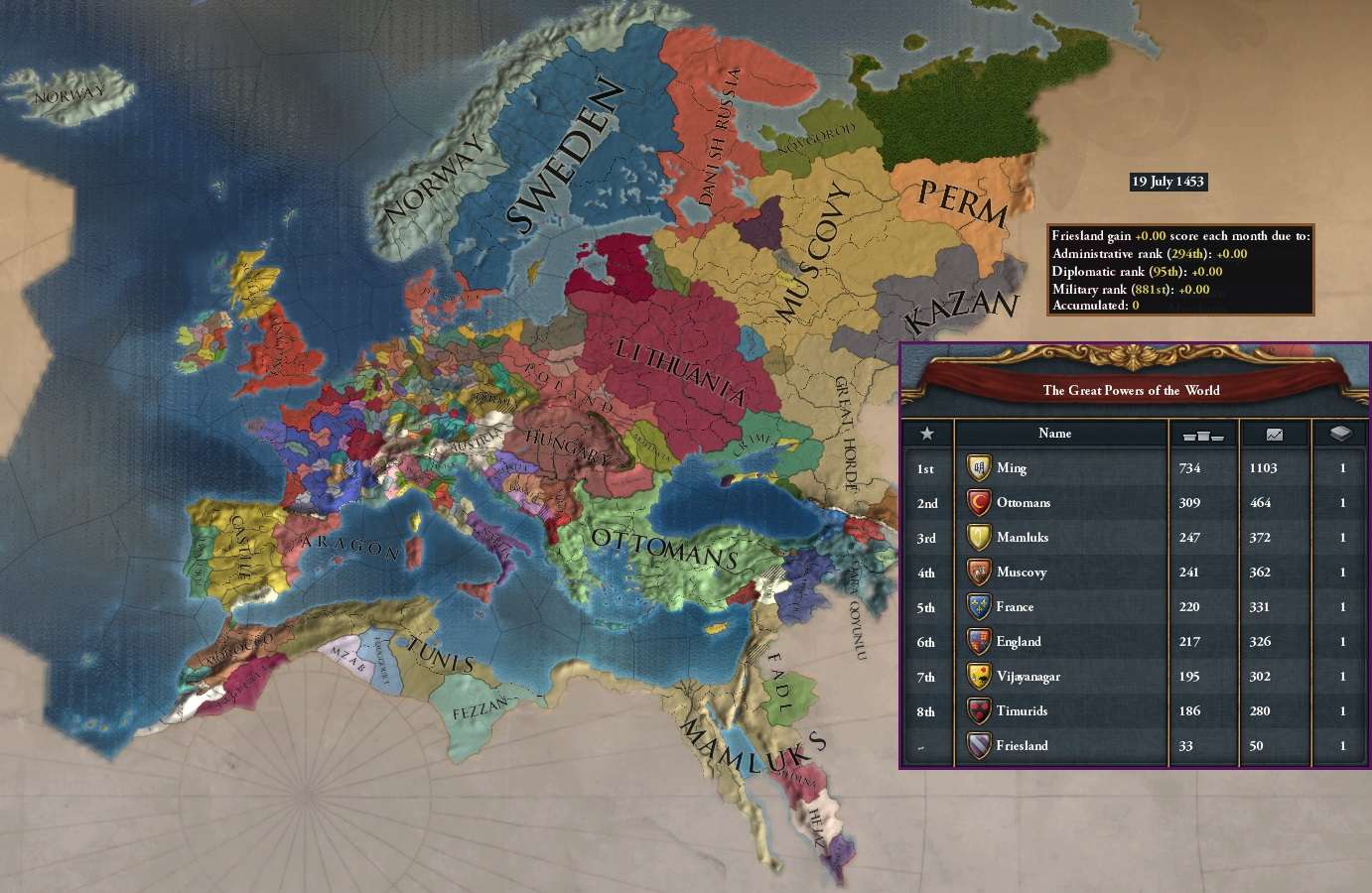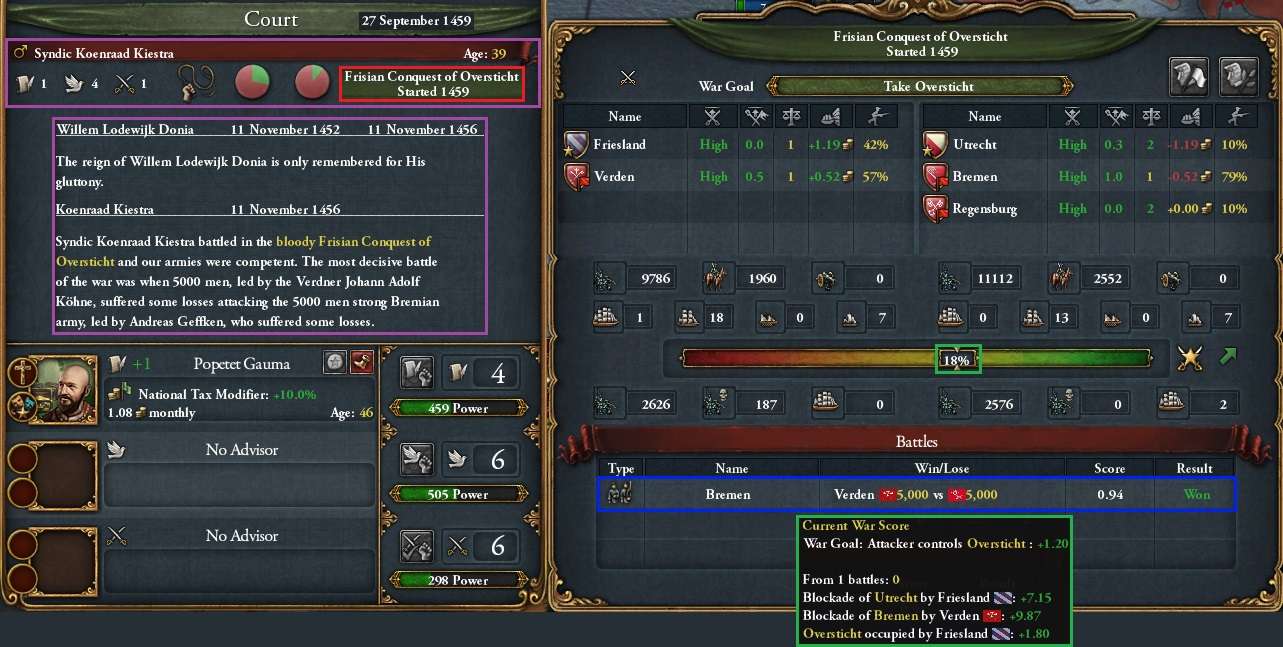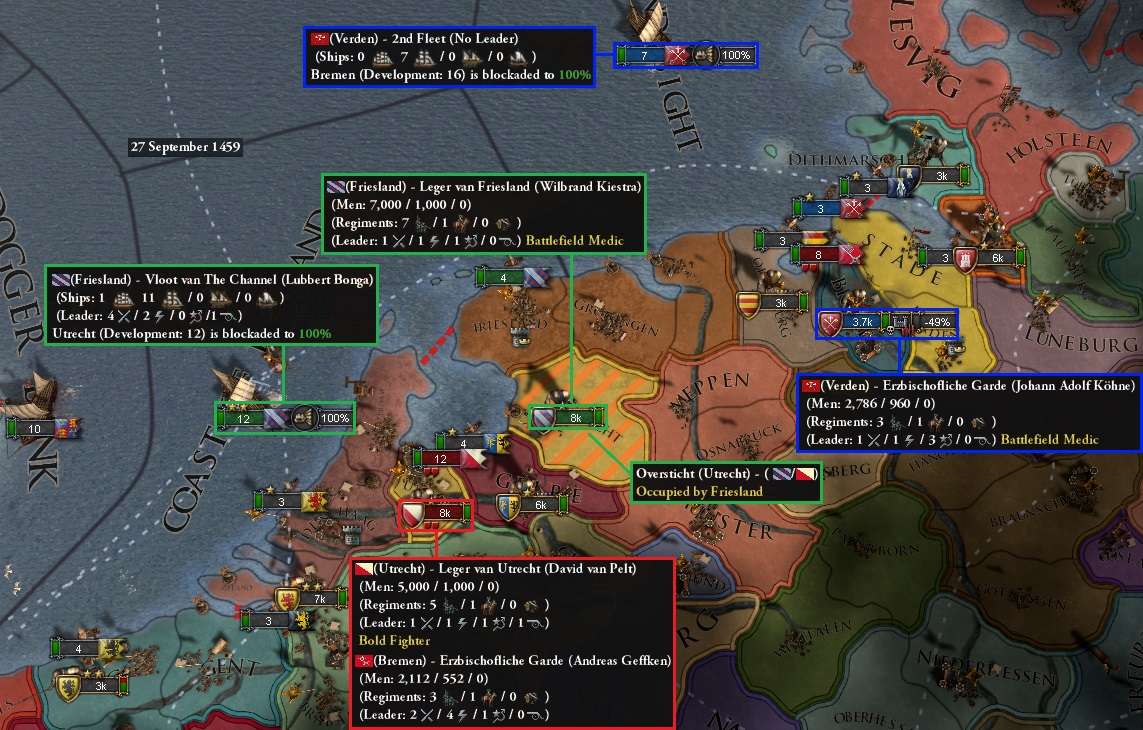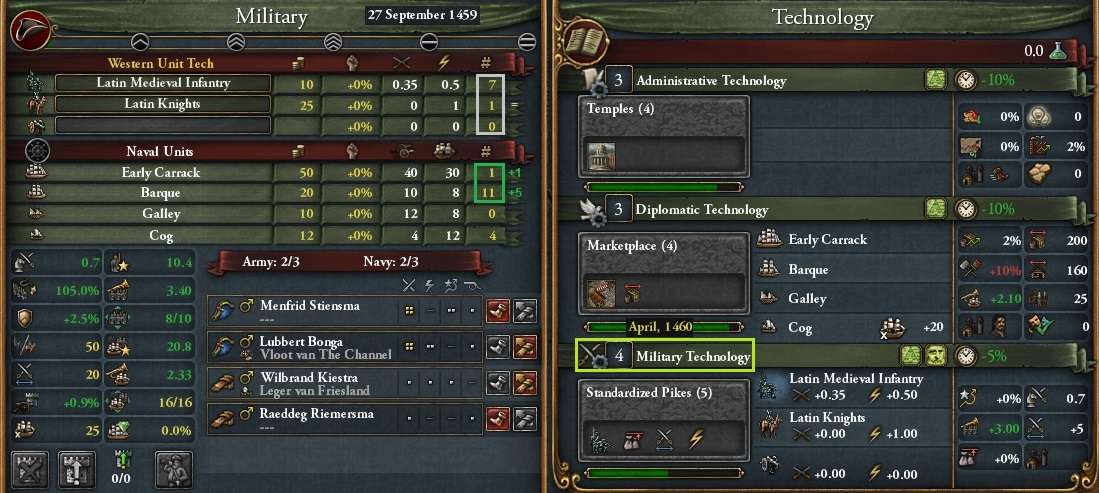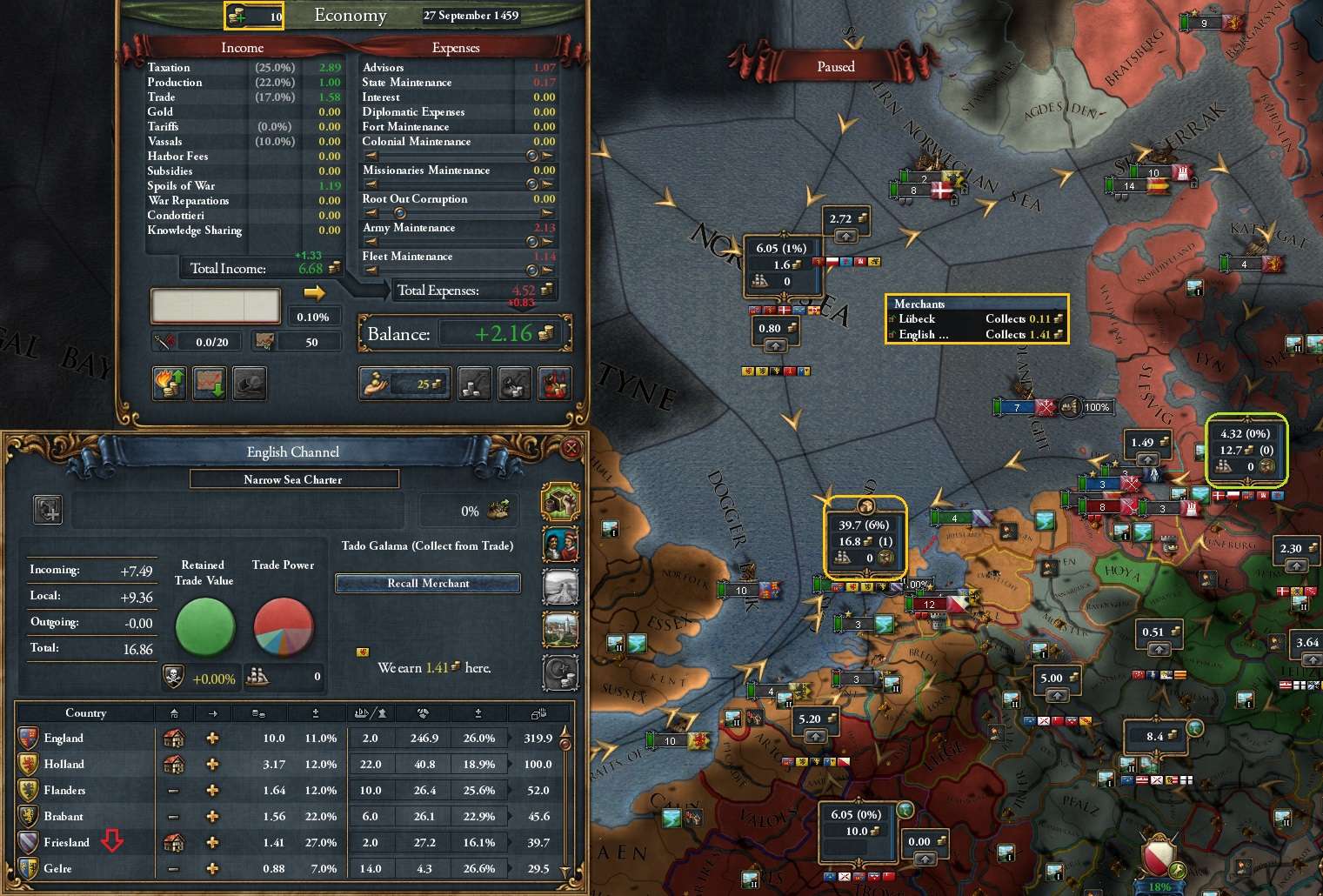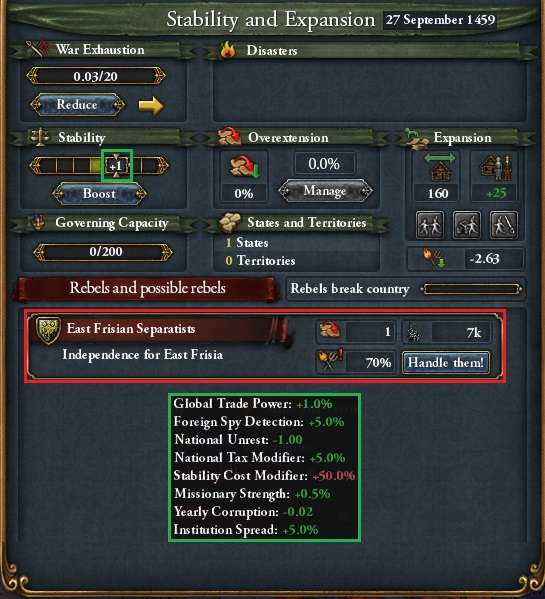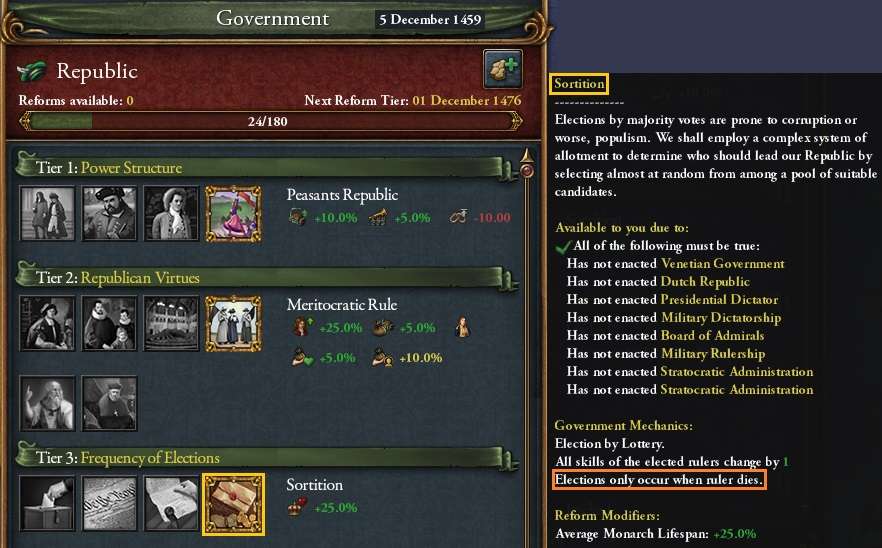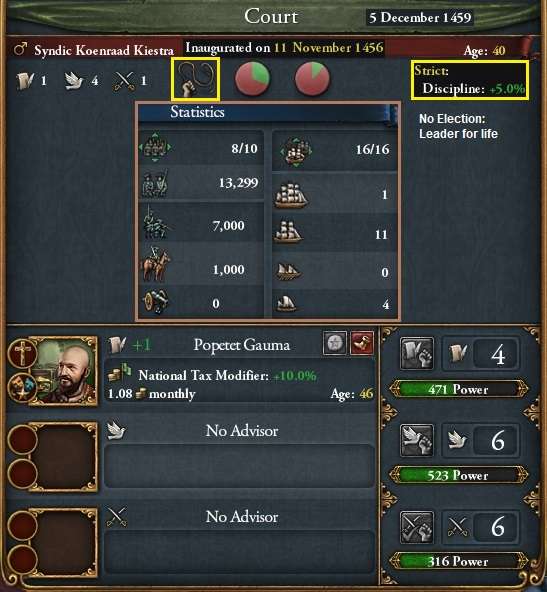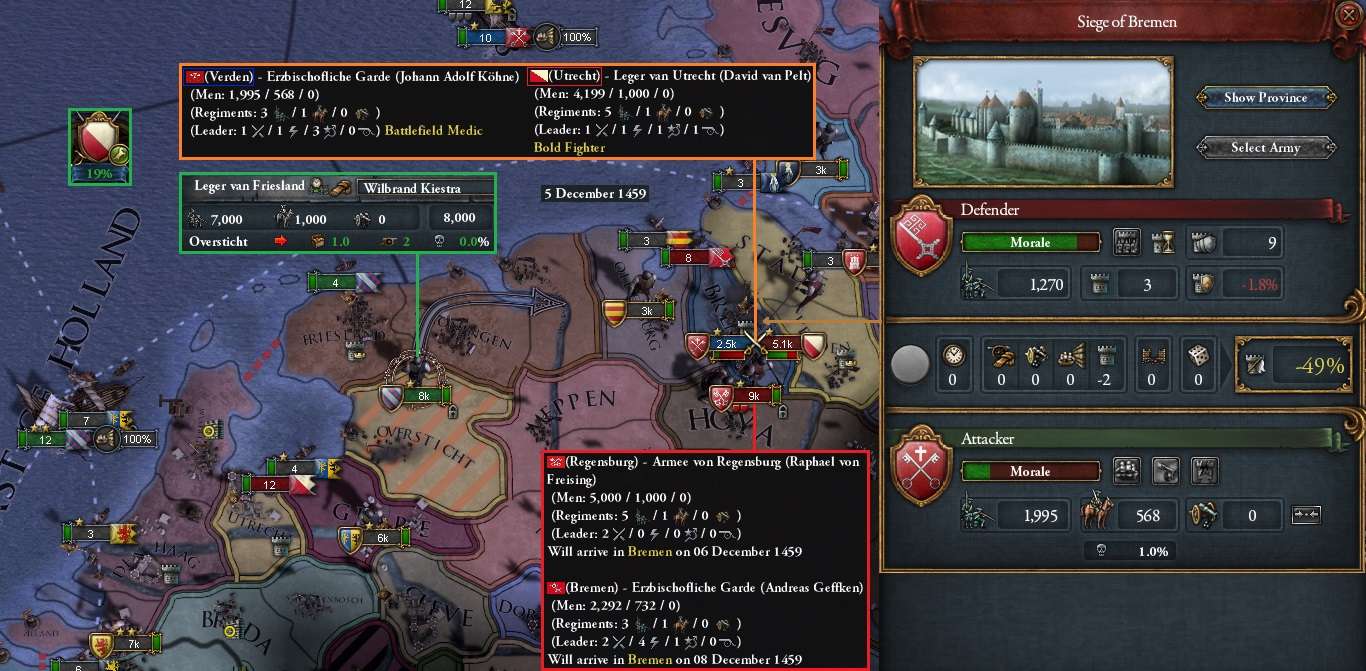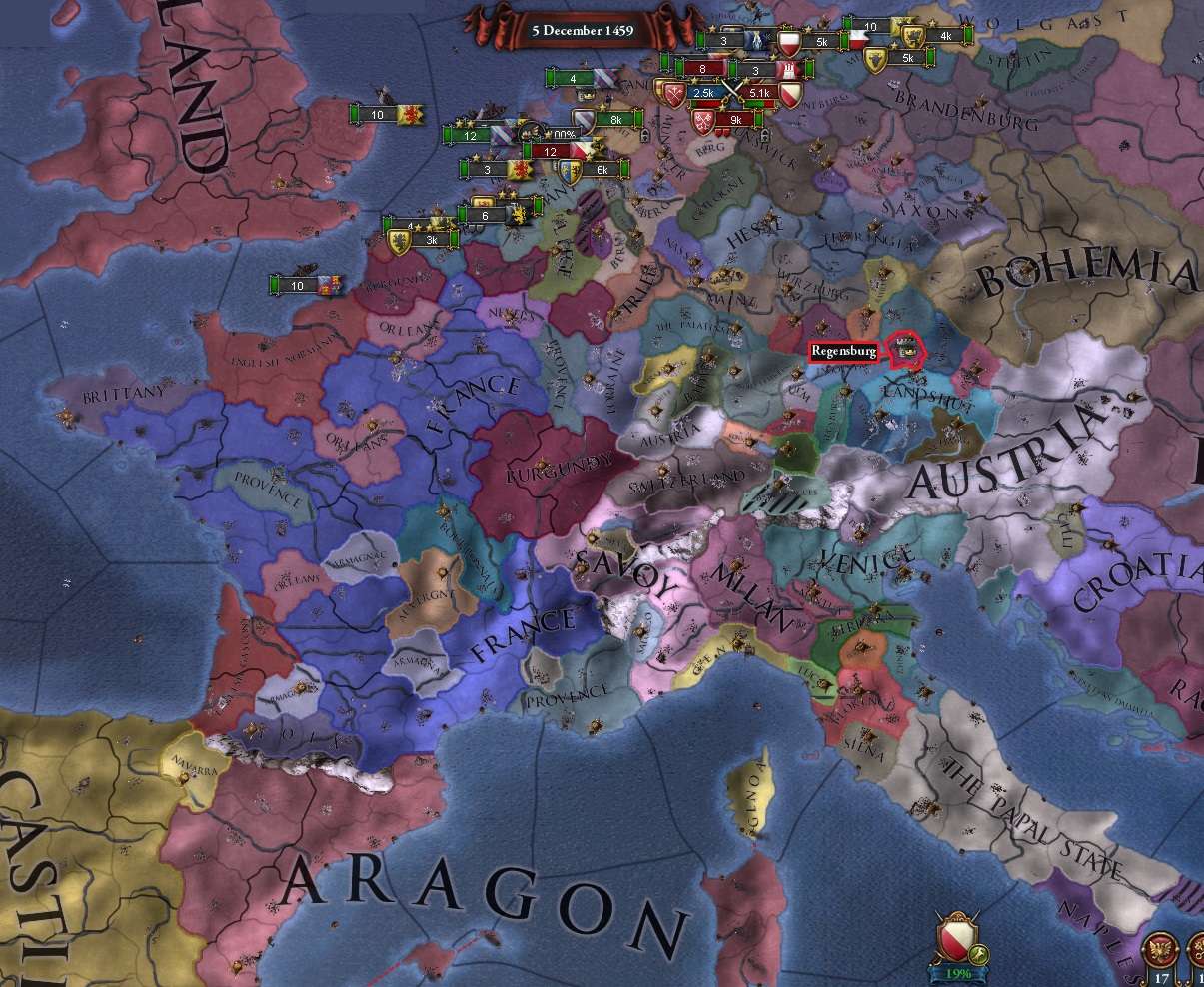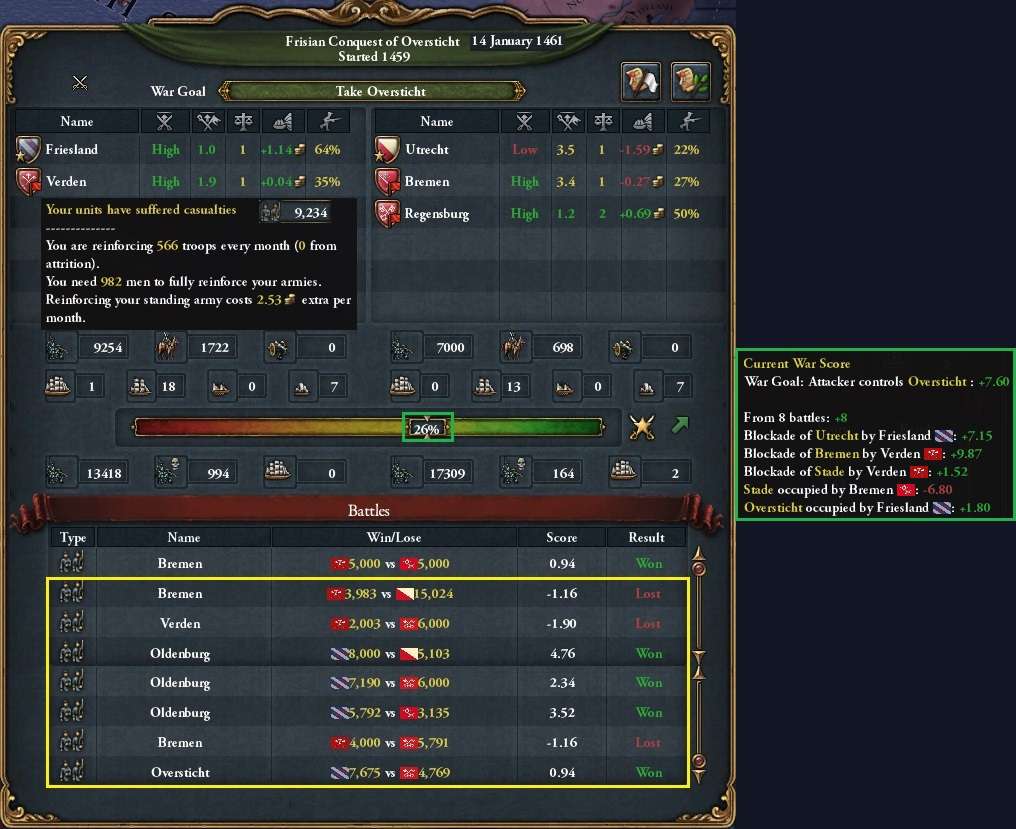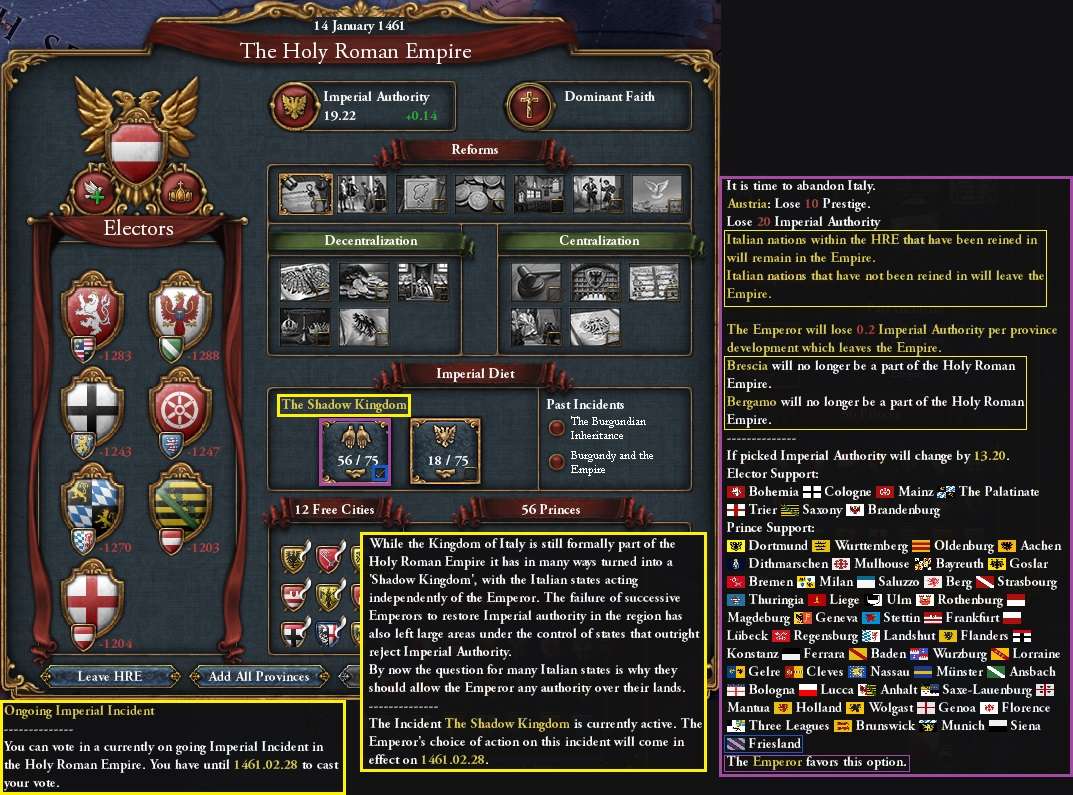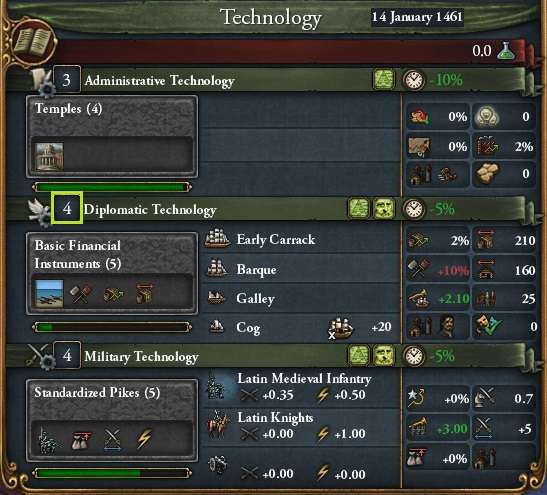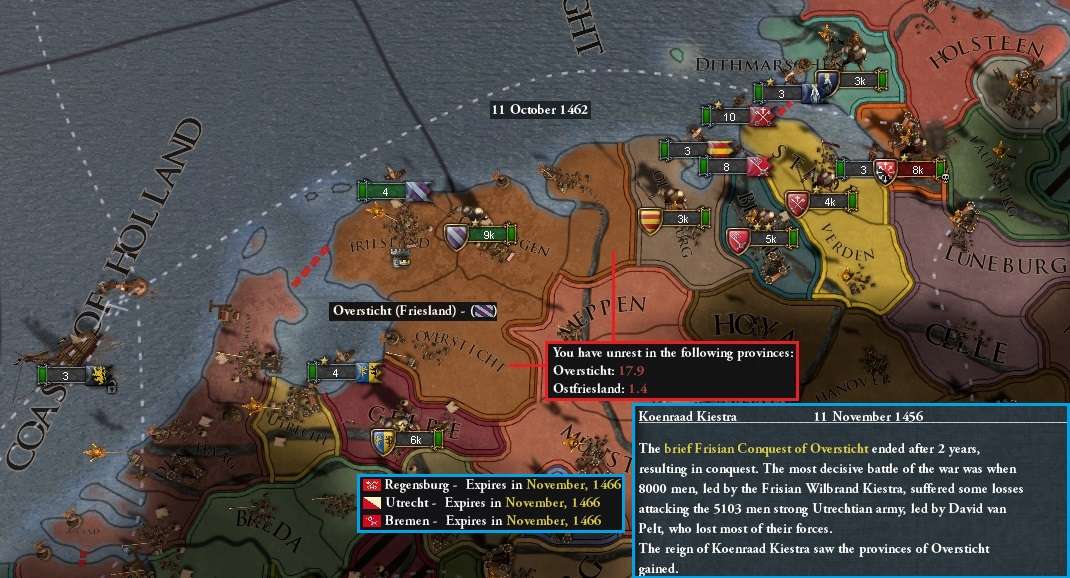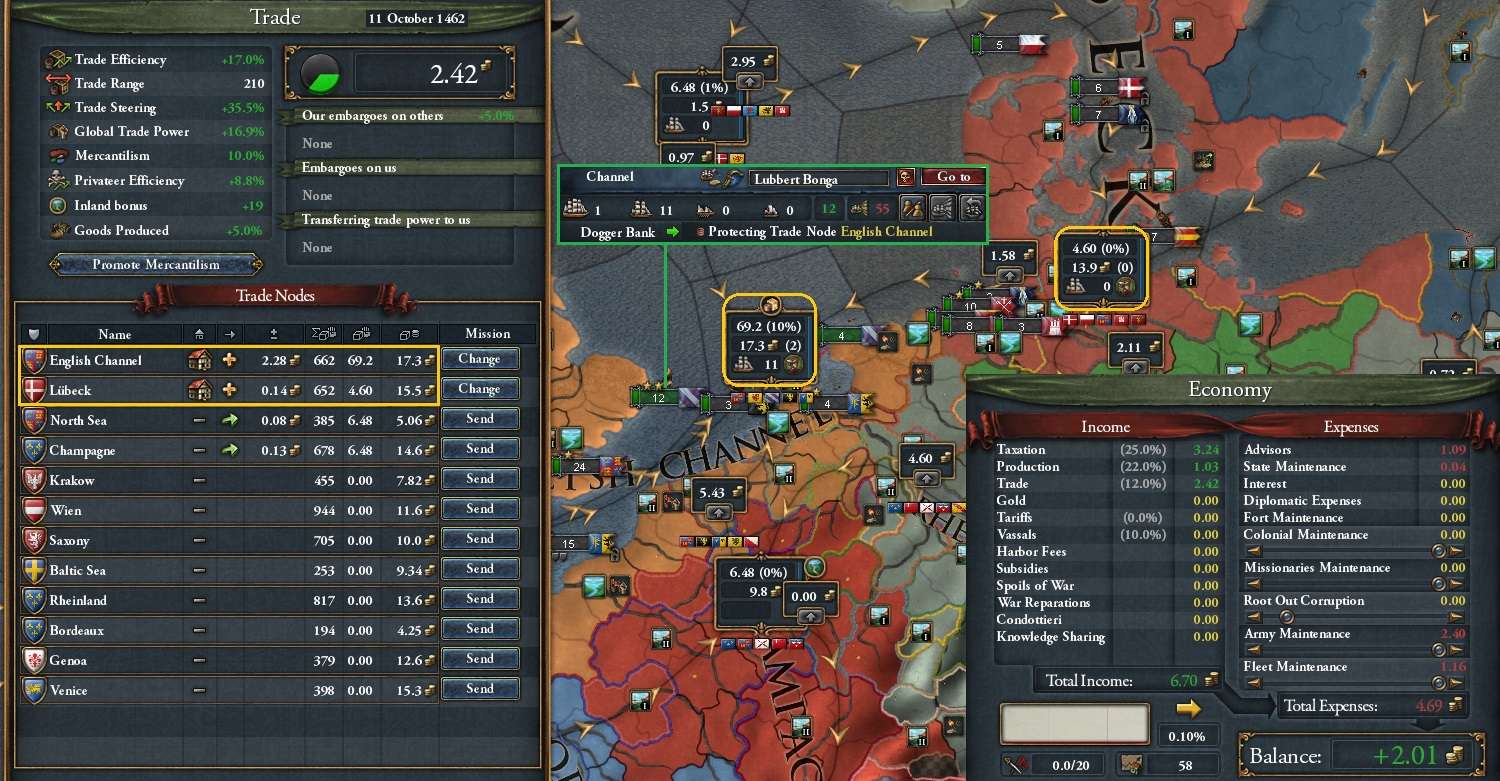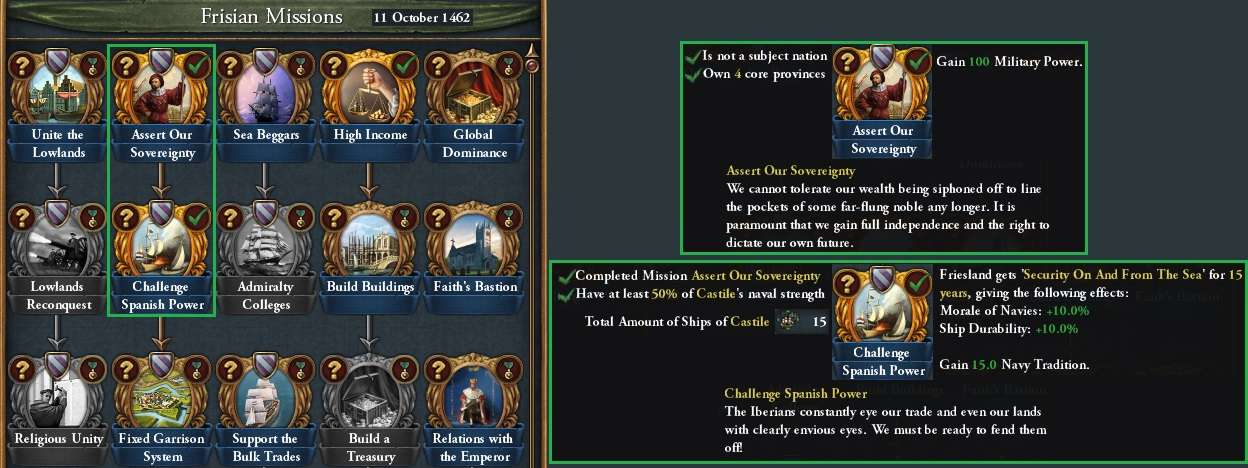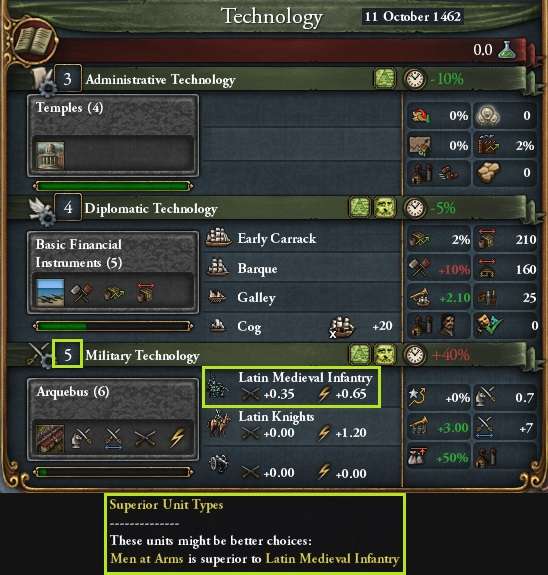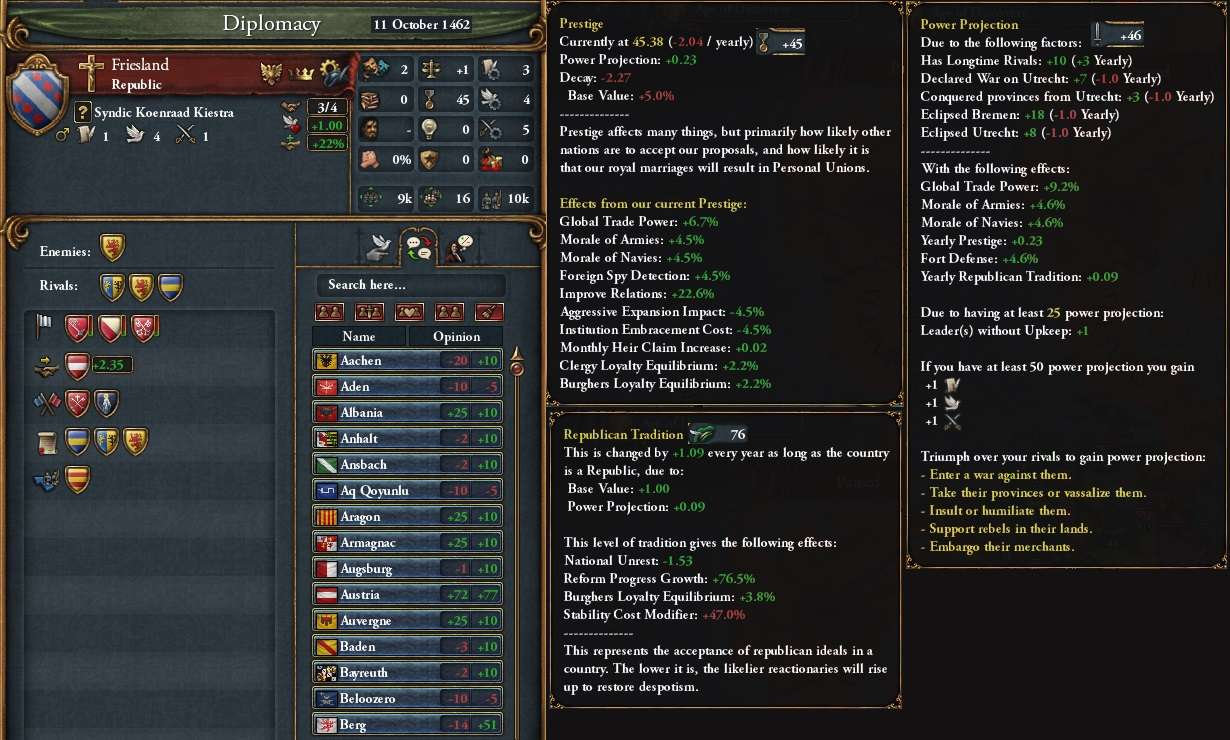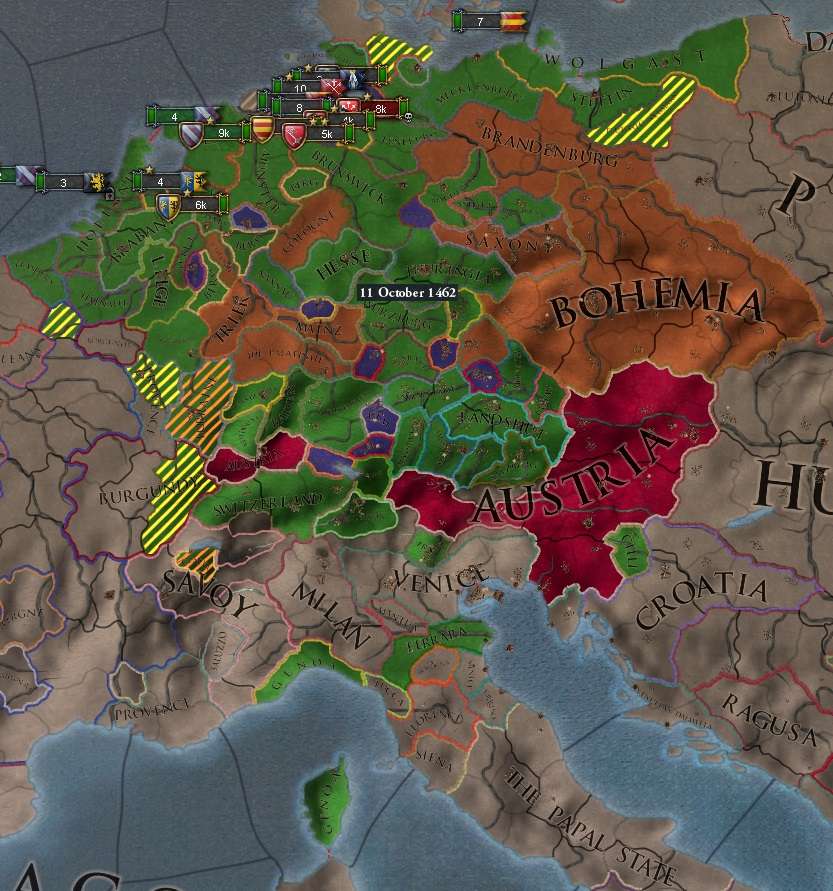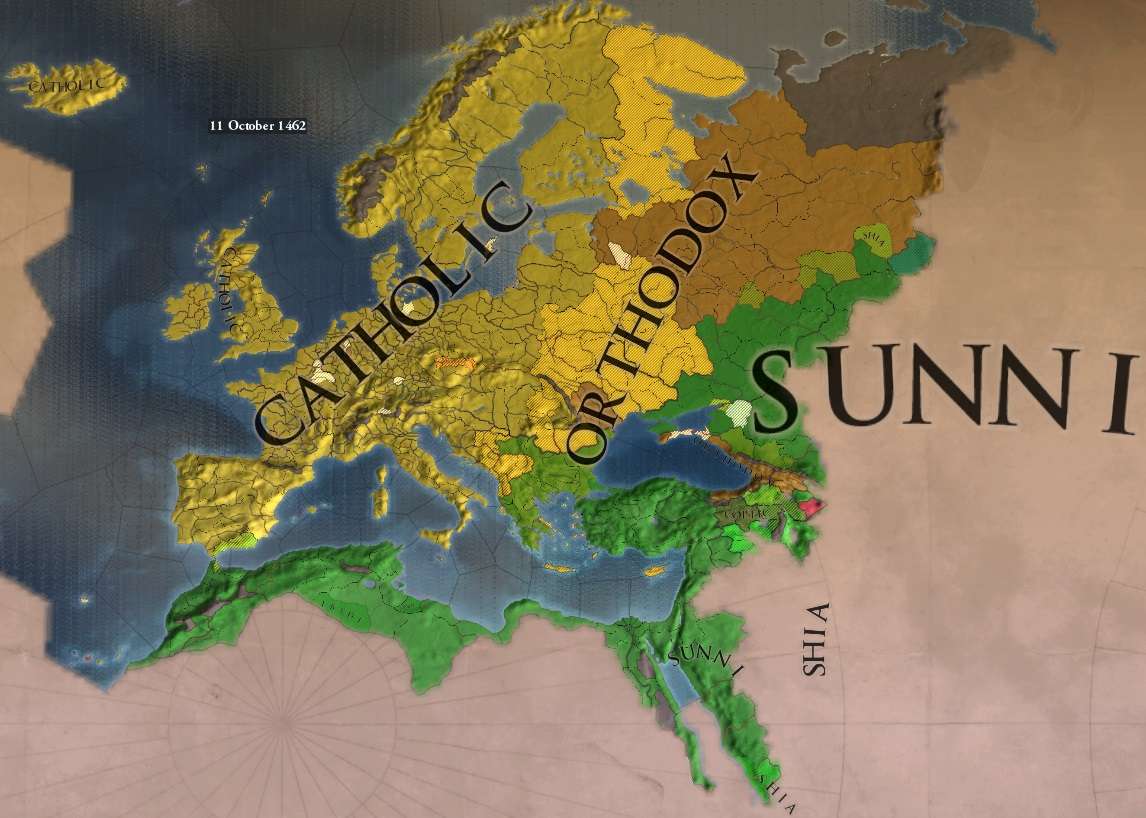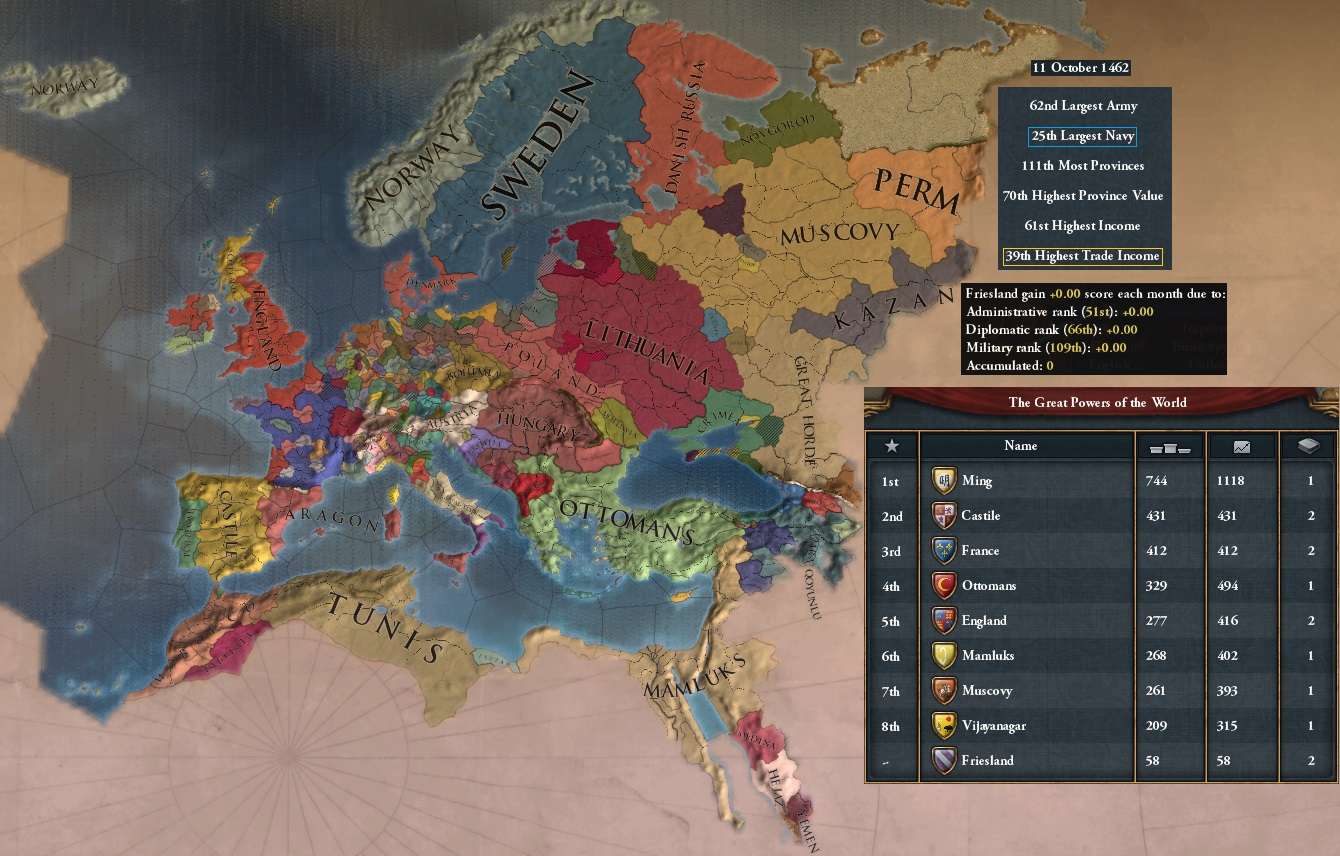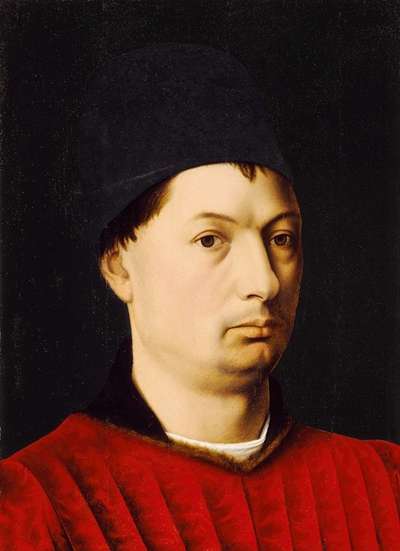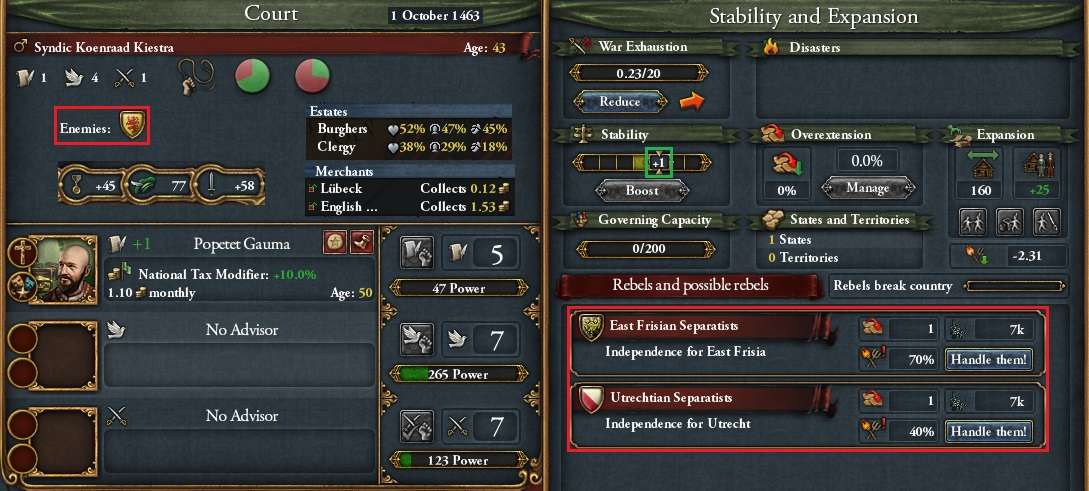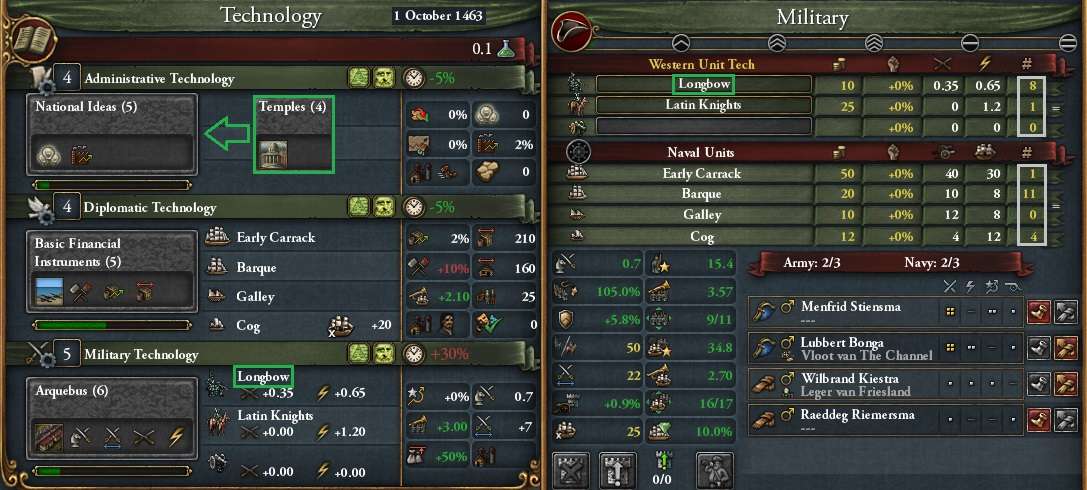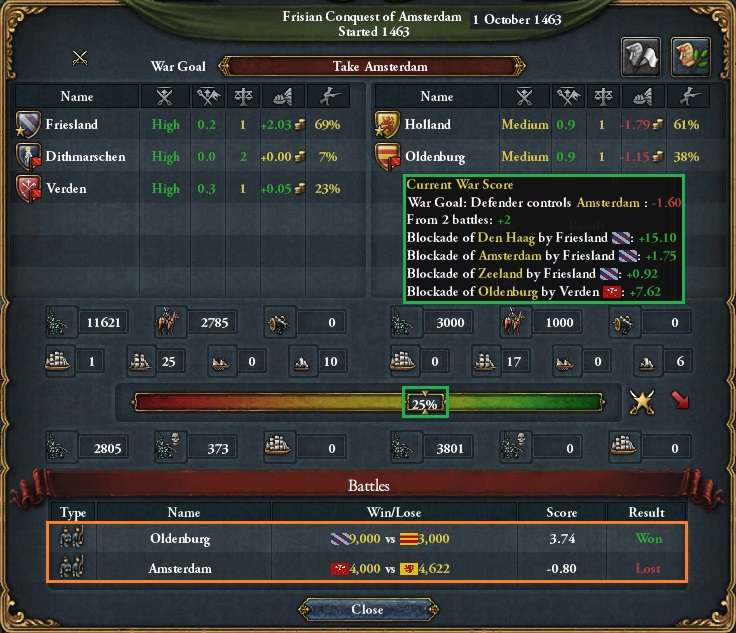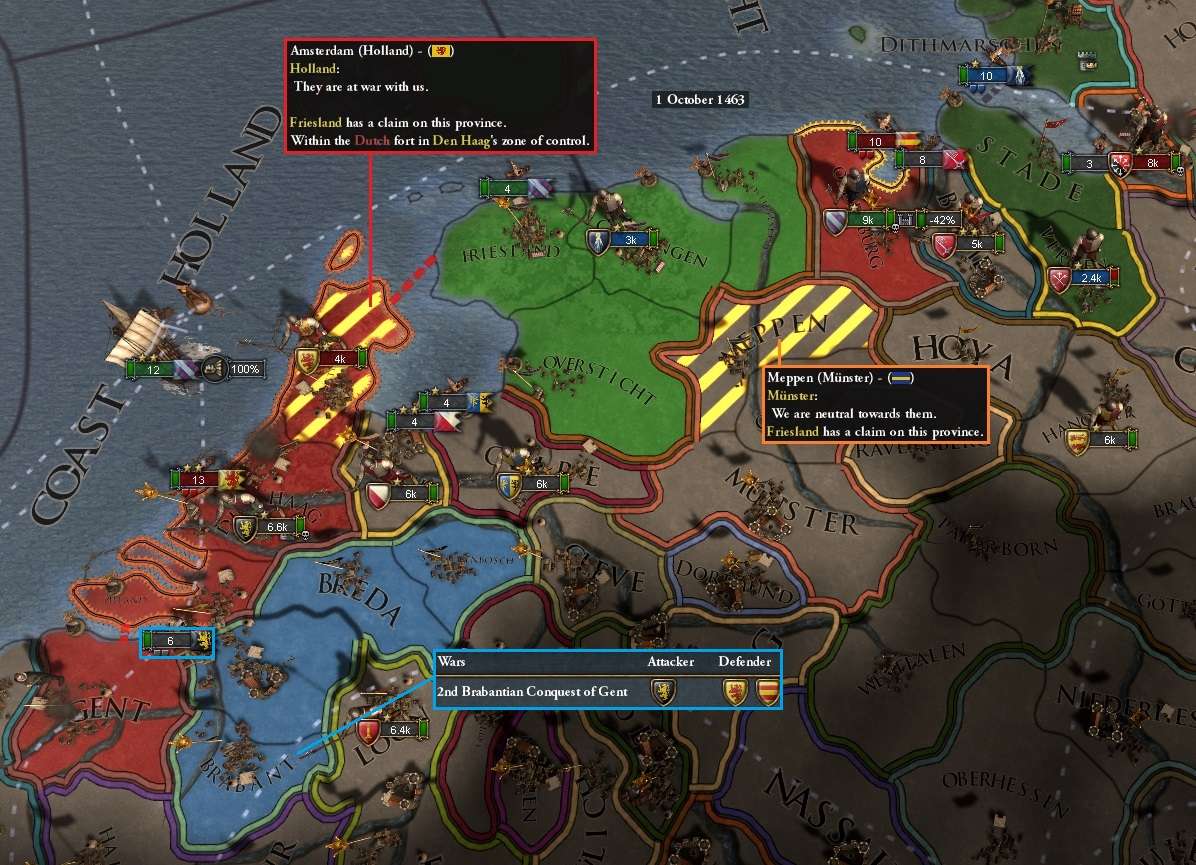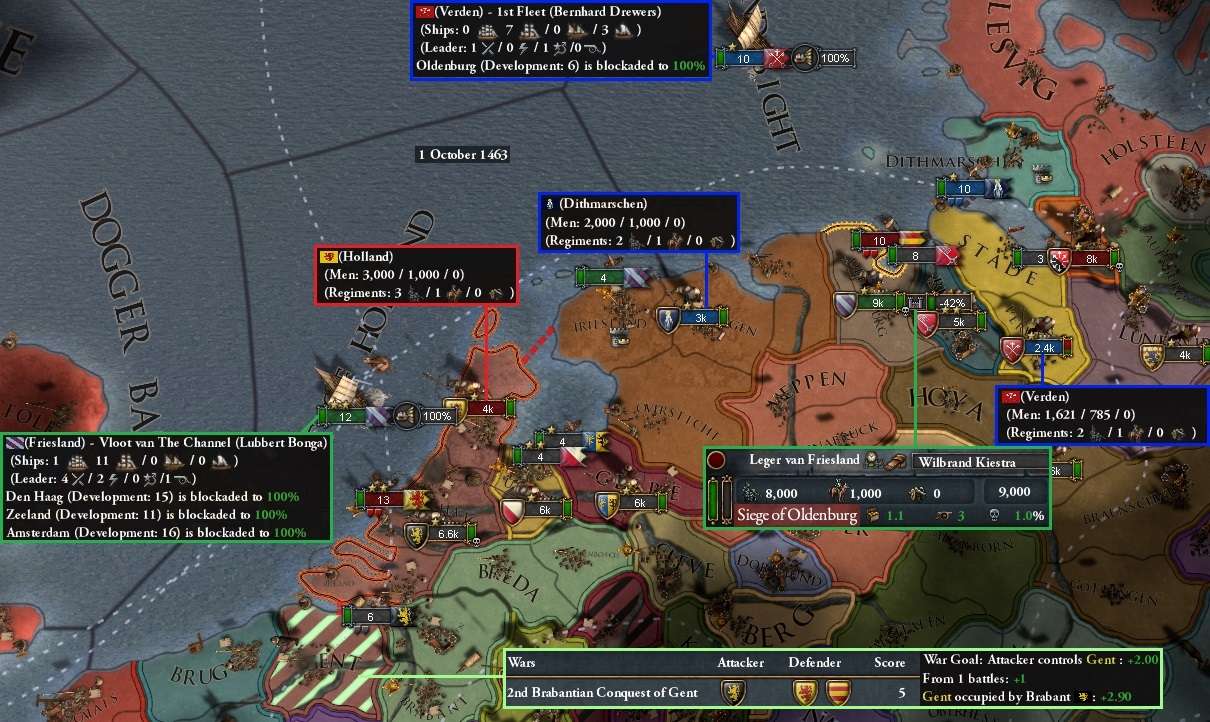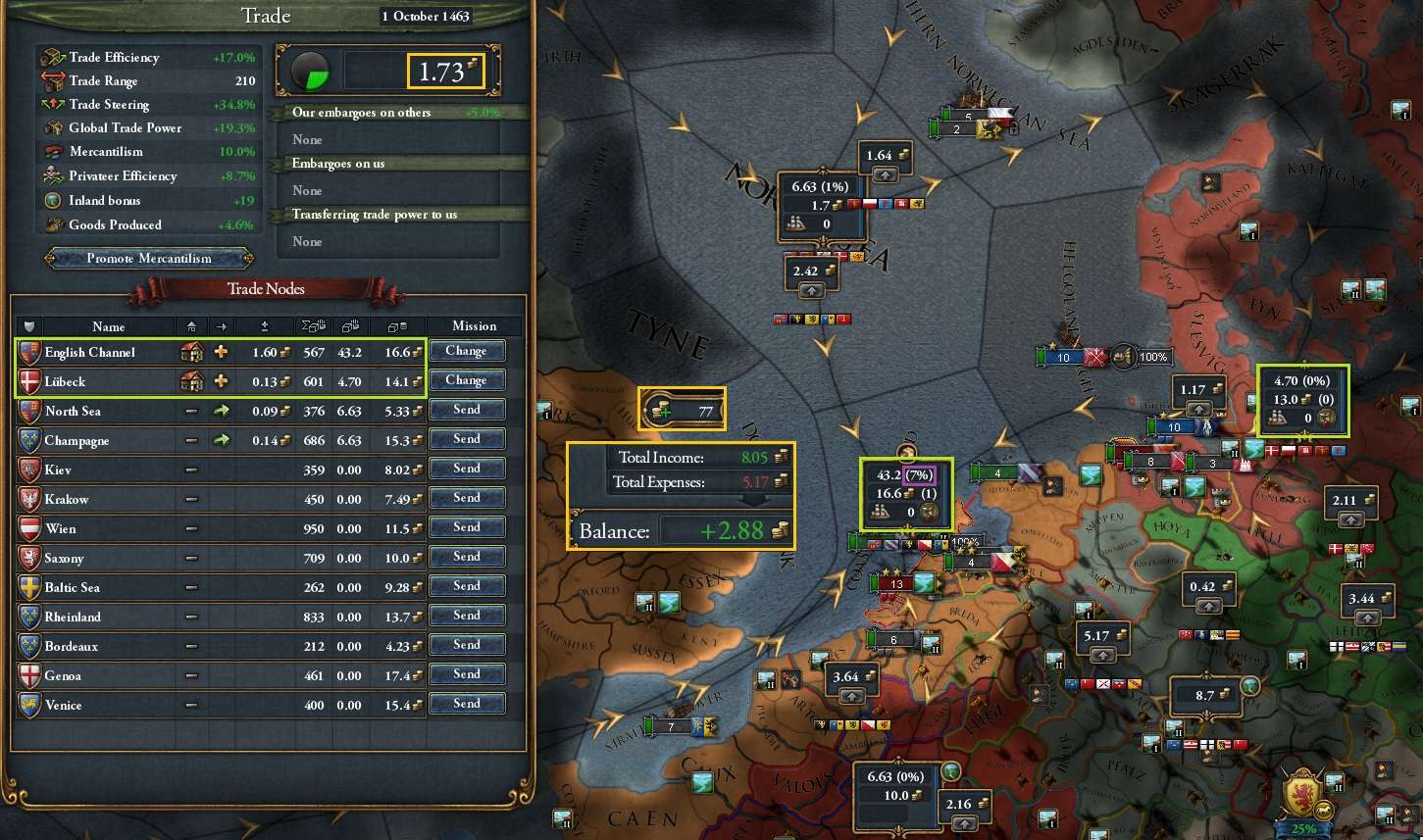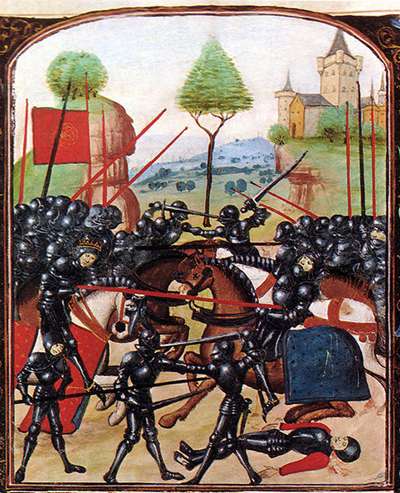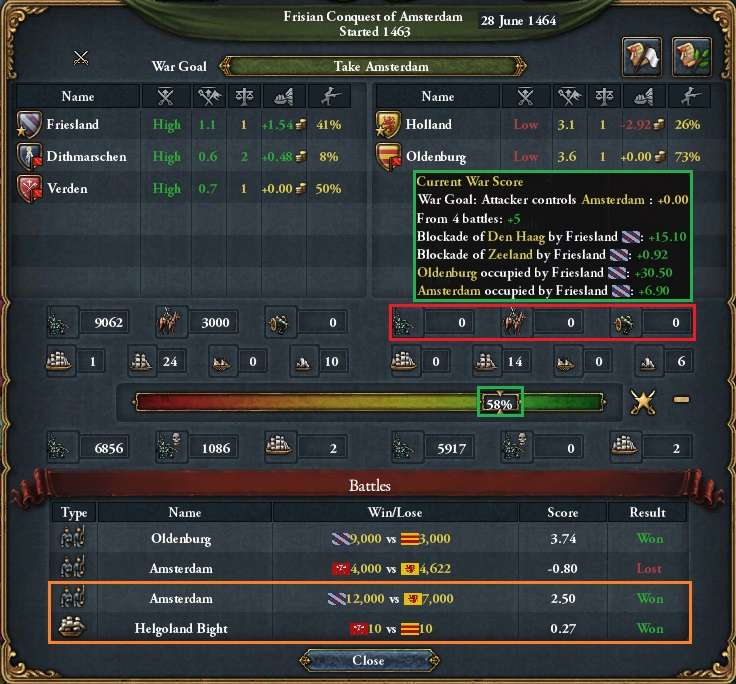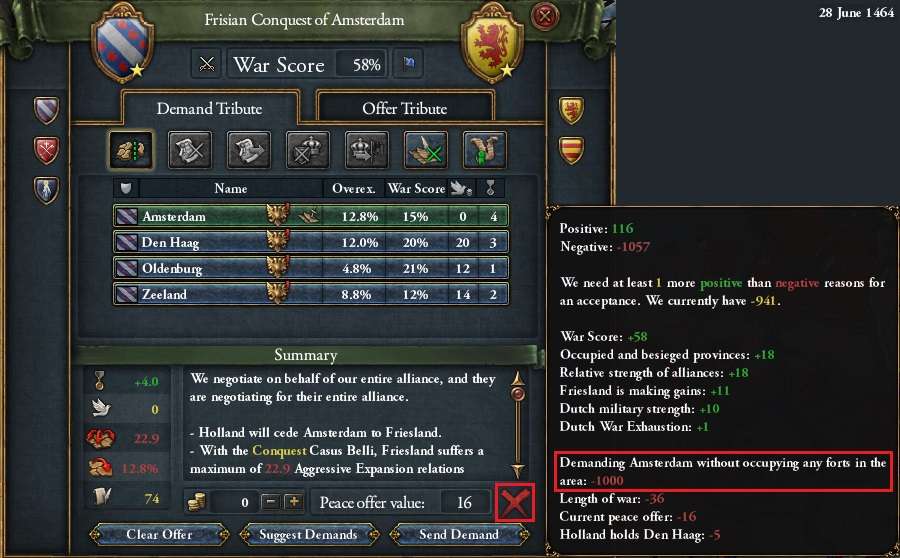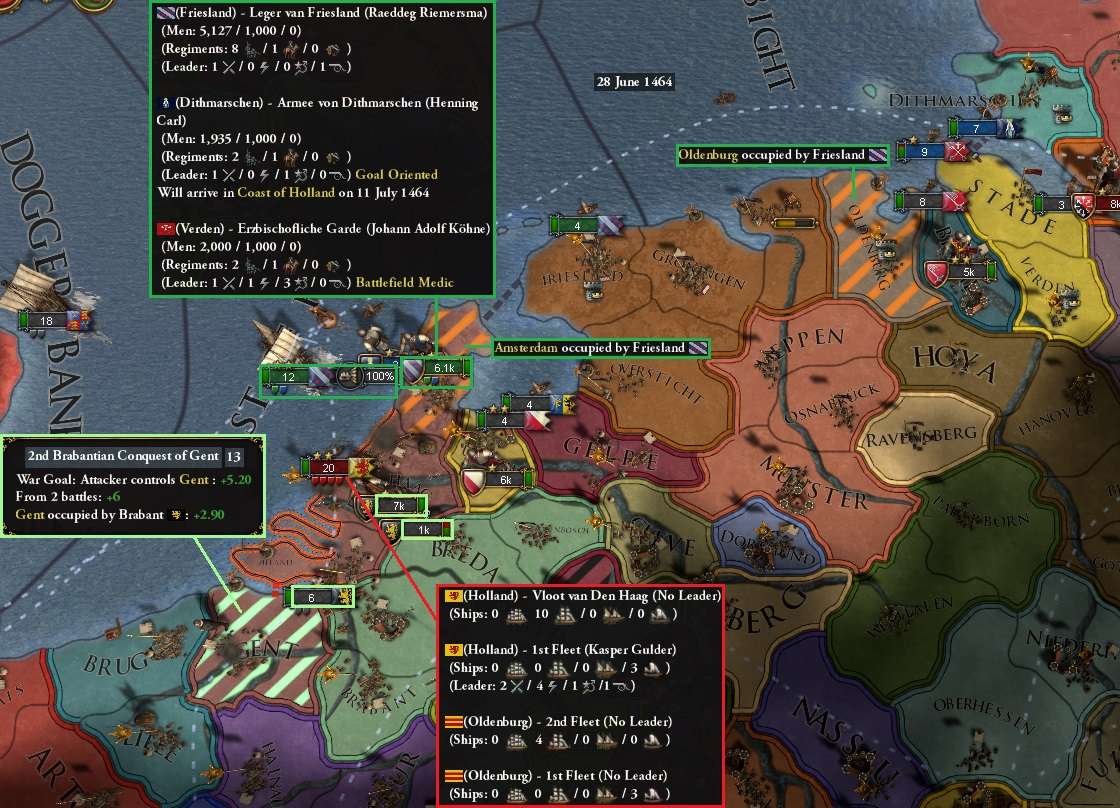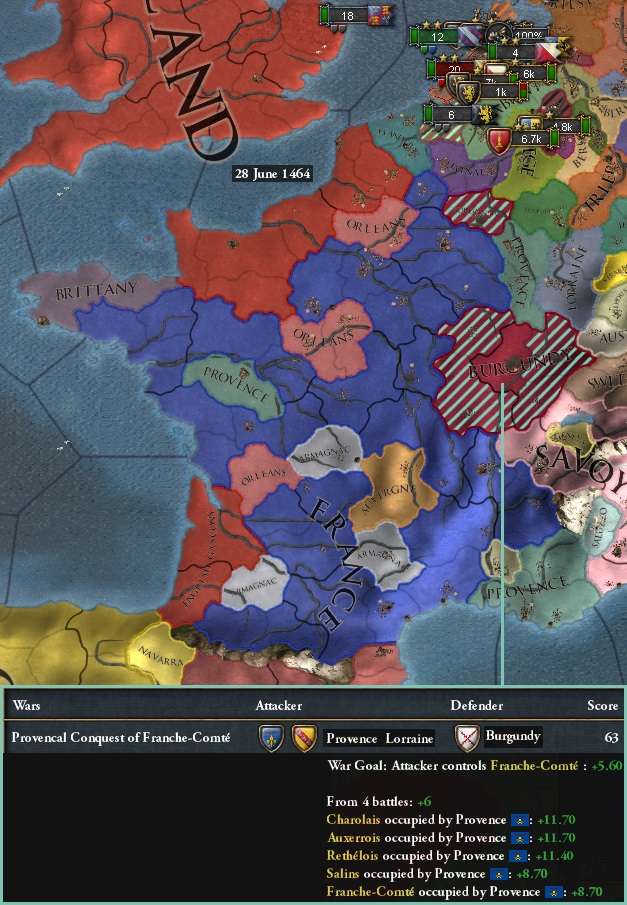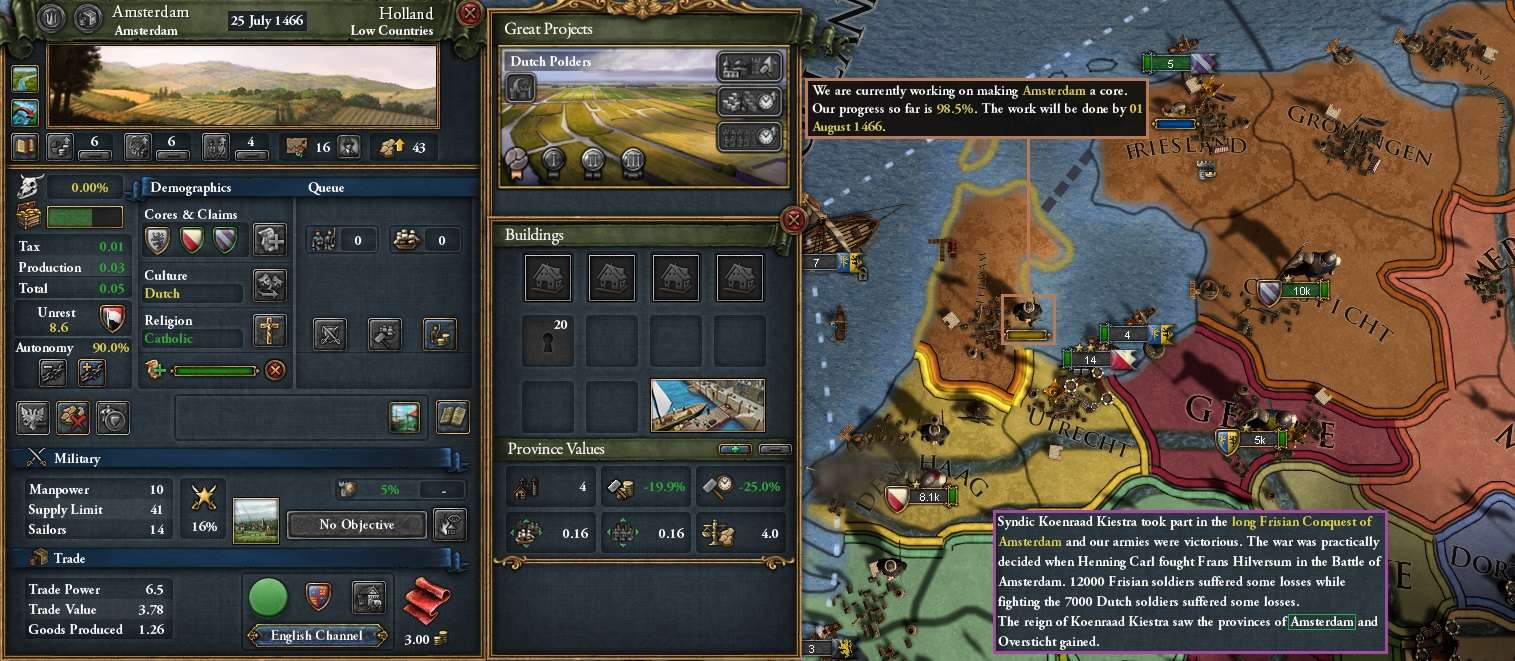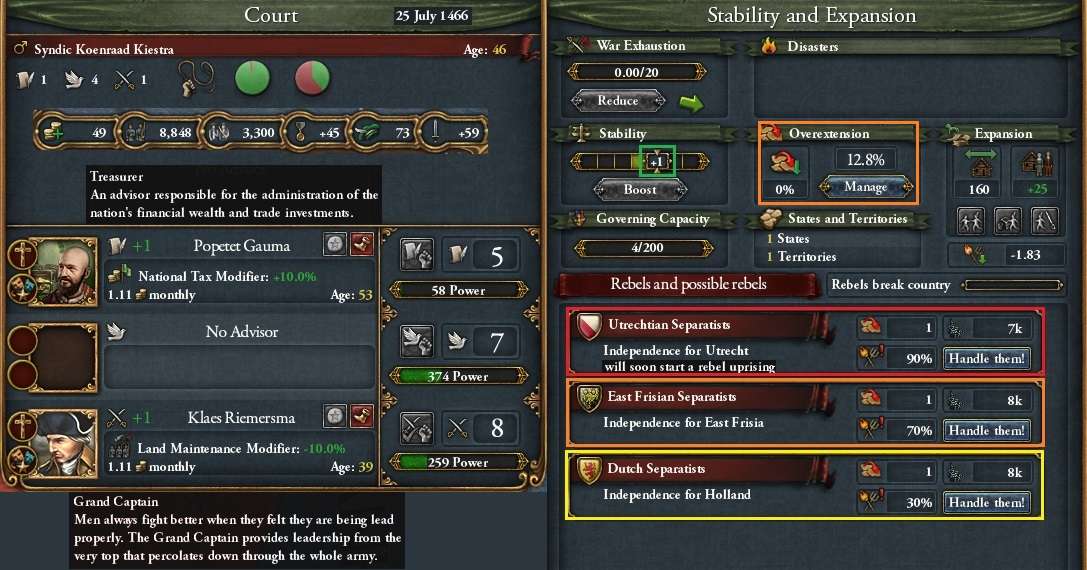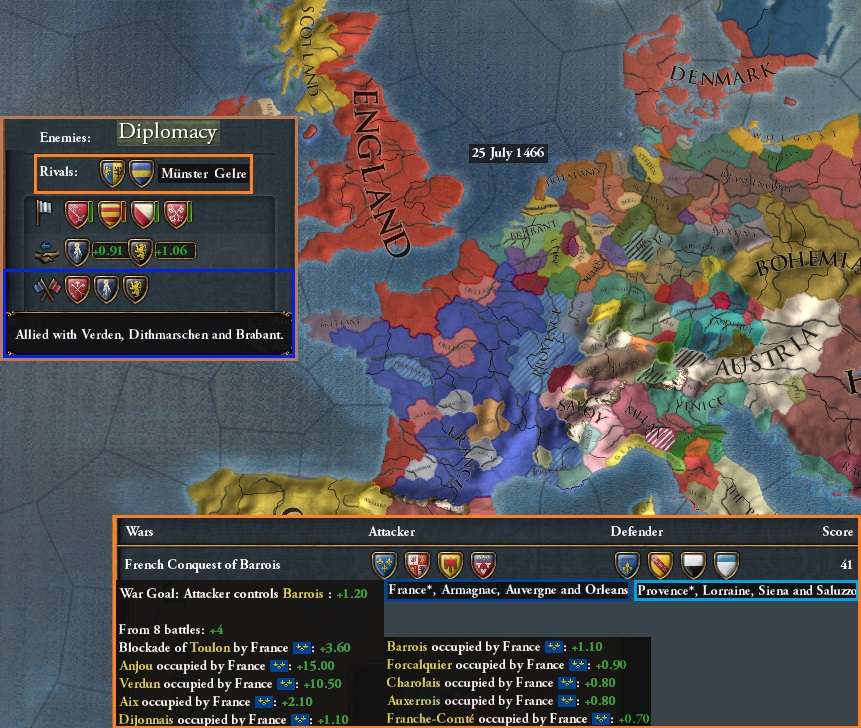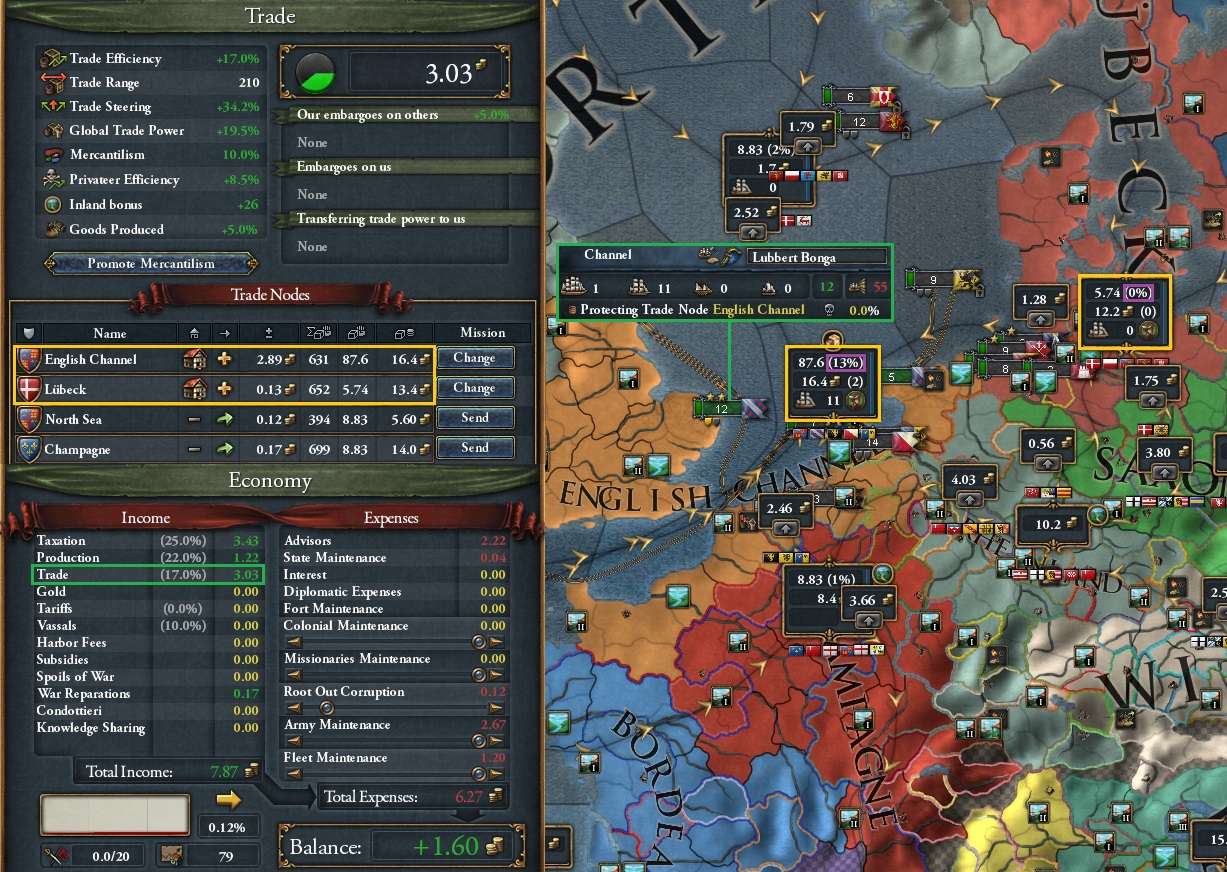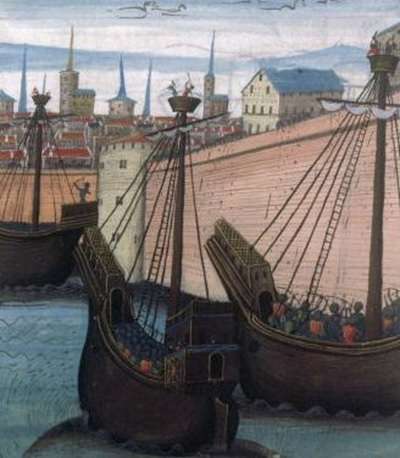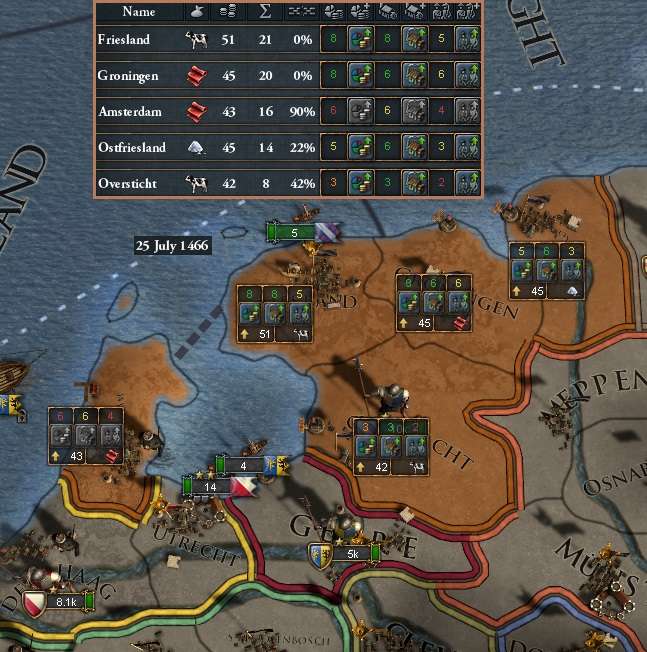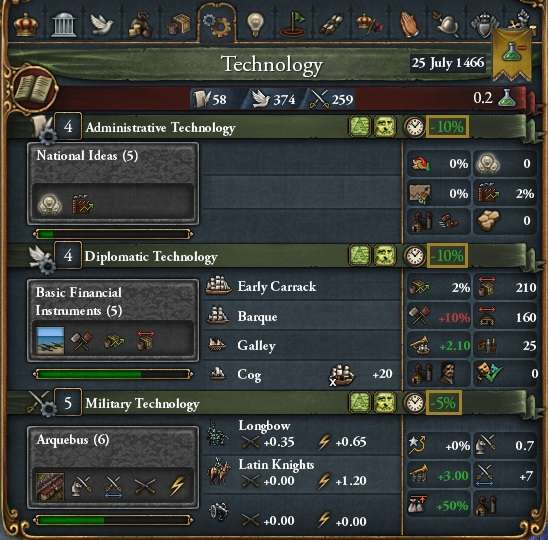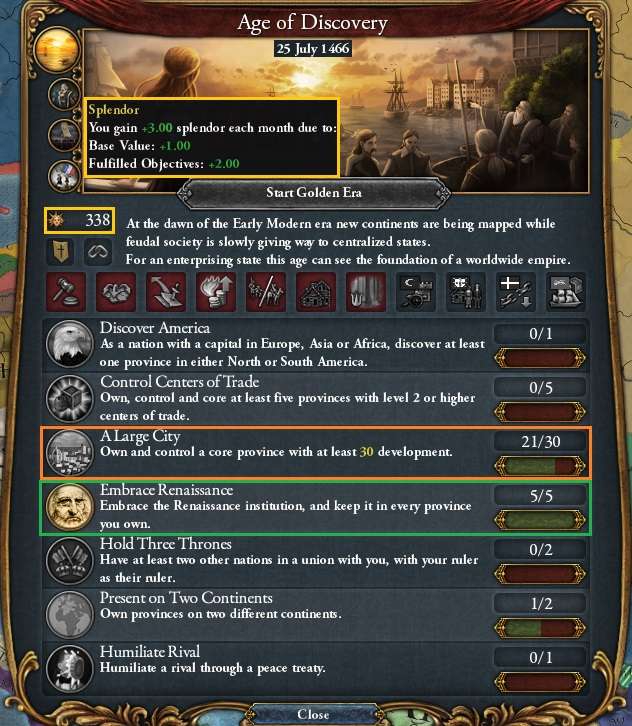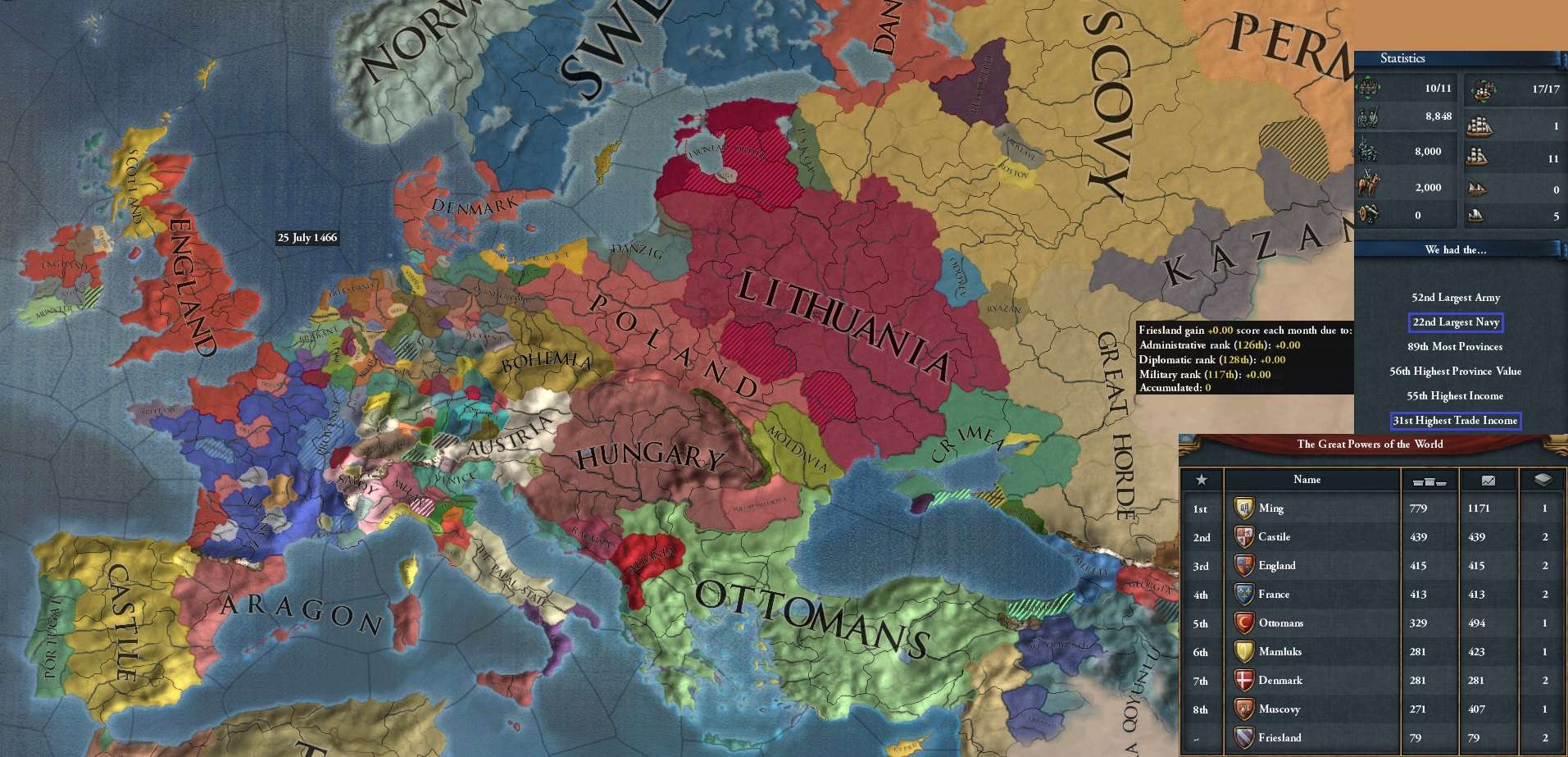Chapter 3: Asserting Our Sovereignty (1448-1462)
♥♥ ♥♥♥ ♥♥
1448-52: Quiet Times
Potestaat (Syndic) Gerulf Van Schellinkhout had presided as the Frisian leader from November 1448 to November 1452, having taken over from Fedde Kooistra not long after the latter’s conquest of Ostfriesland and its absorption into United Friesland. Known as a cautious ruler, little of great note had occurred during his term as Friesland gradually built up its fleet and sought to become a trading power.
♥♥ ♥♥♥ ♥♥
July 1453 – Time is Marked
Schellinkhout was duly succeeded by Willem Lodewilk Donia on 11 November 1452. Donia awoke from a restful and dreamless night's sleep on 19 July 1453 and contemplated the state of the Frisian nation.
The administrator Popetet Gauma remained the only minister in the Frisian court for now, as would be the case for some years yet. The economy was slowly growing, at that time outstripping the recent growth in expenses. The burghers now heavily dominated the clergy, while State landholdings had also increased in proportion.
Friesland had completed its first national objective in the years since 1448, becoming acknowledged as a high income country with long term benefits for future construction projects.
A year or so before, Friesland had generated a territorial claim on Utrecht for Oversticht but had yet to act on it. “Plenty of time for that, no need to be hasty,” was Donia’s view. Though to be fair, that was his view on most things!
Local unrest in Ostfriesland, which remained significantly under-developed compared to Friesland and Groningen, continued; it seemed to be lessening overall, but those who did object to Frisian rule also seemed more militant as time went by. Still, nothing for
Donia to worry about – perhaps a successor may have to deal with such troublemakers. In due course and the fullness of time. Not
him, not
now.
Friesland’s diplomats remained focused on Utrecht, working diligently on both espionage and counter-espionage missions. In regional diplomacy Bremen, Utrecht and Oldenburg were the main opponents, with Verden and Dithmarschen lining up as Friesland’s allies.
For now, Potestaat Donia’s focus remained on trade and the increased generation of wealth. Frisian barques attempted to promote trade in the English Channel (where Frisian traders now ranked third) and Lübeck.
The army had neither grown nor advanced over the last five years, but two new barques (now working off Lübeck) had been built. However, the republican virtue of meritocratic rule had been made – boosting the loyalty and influence of the burghers as well as promoting female advancement.
In the wider region, France was embroiled in a major war, including against Burgundy, Nevers and the Papal State, to take Nantais from Brittany.
In the ‘known world’, the Ottomans had consolidated and expanded their empire in the last few years, especially in the Balkans. Friesland remained an insignificant power by world standards.
♥♥ ♥♥♥ ♥♥
September-December 1459 – Dreaming of a Greater Friesland
Donia’s term had expired with little fanfare, with Koenraad Kiestra taking the helm on 11 November 1456. And Kiestra’s dreams were far grander – and bloodier – than those of his two most recent predecessors. In the third year of his term he launched a war to enforce Friesland’s claim on Oversticht, drawing in allies on both sides into a wider sub-regional conflict.
Verden fought with Friesland, while Bremen and more distant Regensburg had sides with Utrecht, giving them an edge in total army numbers fielded. But between them, Friesland and Bremen dominated the naval campaign. So far, the war was going in Friesland’s favour.
On 27 September 1459, he was woken from a rather restless slumber by an orderly, bearing a report from his brother, General Wilbrand Kiestra. The target of the current conquest had now been fully occupied, while Verden had won an earlier (and evenly matched) battle against Bremen in Oldenburg.
Friesland and Verden had the enemies’ fleets bottled up and their ports blockaded. The remainder of Verden’s army under General Johann Köhne was trying to besiege Bremen, but did not have the numbers to effectively do so. The main army of Utrecht remained in its capital, along with the previously defeated army of Bremen. There had as yet been no appearance of Regenburg’s army – presumably still off to the south-east somewhere.
The last six years had seen considerable growth in the Frisian navy, which had added another five barques and an early carrack, to add some additional gun power to the fleet. The first recent advance in military technology had been made, adding a little to the army’s shock and firepower, though it remained the same size and its tactics were still dominated by old-style regiments of Latin infantry and knights.
The diversion of the Frisian navy from trade protection to wartime blockade tasks had seen a temporary downturn in trade power and income, especially in the major trade node of the English Channel. Despite this, the economy remained strong enough overall with taxation, production and some looting holding the balance positive.
The stability of the realm had also improved in recent years , while East Frisian separatism festered but had not yet demanded immediate attention.
♥♥ ♥♥♥ ♥♥
By early December, the Frisian election system had been reformed, with fixed terms being dispensed with. Henceforth, the Potestaat would rule for the rest of his life, allowing a single ruler to better improve his skills with time and – for better or worse – govern for longer.
This meant Koenraad Kiestra’s reign was secured. He was still only 40 years old and regarded as a strict disciplinarian, which helped keep the military in line, at least. Gauma remained the sole minister, his main role as an administrative specialist being to oversee the efficient collection of taxes.
In the field, Utrecht’s army had slipped away out of sight, appearing in Bremen to attack the far smaller Verdner army of Johann Köhne, which was now close to breaking. With Regenburg and the remnants of the Bremian armies due to appear there in the next few days, Köhne’s siege of Bremen and his army’s fate were sealed.
Perhaps a little too late, Kiestra’s Leger van Friesland had now been on the march for a few days, heading east to Ostfriesland to see if any targets of opportunity might be found should the enemy fail to keep their numerically superior forces united. The blockades remained in place.
France had in the meantime won its war for Nantais and thus expanded further into Brittany.
♥♥ ♥♥♥ ♥♥
January 1461 – Wins and Losses
After another year of war, a series of eight battles had been resolved. The first had been the predictable loss by Verden in Bremen, followed by another at the hands of Regensburg in Verden itself. This had been followed by three major Frisian victories, as they managed to pick off each of the enemy armies one by one, each time in Oldenburg. Regensburg managed to defeat Verden one more time in Bremen, but Frisian had then defeated them after the Regensburger's sorties across to Oversticht. On balance, Frisia had improved its bargaining position but the war continued.
At this time, Verden was attempting to besiege Utrecht but once more did not have enough troops to do it properly. Having secured Oversticht, Kiestra was now marching the Leger back east, where he hoped to rescue Verden from enemy occupation and siege at the hands of the Regensburgers, who had returned there following their earlier defeat in Oversticht. Utrecht and Bremen had been driven from the field for now, while an uprising in Hamburg was not expected to spread into Verden.
Friesland, while independent, remained one of the many principalities within the Holy Roman Empire. After controversies over the place of Burgundy in the Empire in previous years, now a crisis was brewing in northern Italy, dubbed ‘the Shadow Kingdom’ at the time. Frisia cast its vote for what was already a majority, with even the support of the Emperor: Brescia and Bergamo would leave the Empire, but the rest would remain.
Diplomatic research had recently advanced, though Frisian technology still lagged most countries somewhat across the board, especially now administration.
♥♥ ♥♥♥ ♥♥
October 1462 – Greater Friesland
Kiestra’s dream of a Greater Friesland had been realised in November 1461, with the Dutch speaking Oversticht added to the realm.
The Frisian fleet was now again devoted to trade protection, concentrating its efforts on building trade power in the crucial English Channel zone. But taxation still remained the largest source of income.
The conquest of Oversticht had seen two Frisian missions achieved simultaneously: the assertion of sovereignty had seen military power increased, which had then led to a successful challenge of Spanish naval power given the previous big expansion of the Frisian fleet.
This sparked another advance in military technology, which would soon lead to the adoption of superior infantry formations and Frisia finally getting ‘ahead of the curve’ in a branch of research.
Frisian prestige and power projection had increased after their recent exploits, while the strength of republican tradition remained fair, if not outstanding.
The HRE’s recent retreat in northern Italy had left Genoa and Ferrara still within it, but now somewhat isolated.
Catholicism remained dominant in Western and central Europe. In Russia, principally Muscovy, Orthodoxy reined, while it remained in dispute in Eastern Europe, especially with Catholic Lithuania controlling much Orthodox territory. Sunni Islam dominated the Ottoman Empire, the Mamluk realm and North Africa.
Frisia’s recent gains had seen it rise in its relative place in the world, especially in naval and trade power, but it remained very much a third-rate power.
